#you may think the last quote is incongruous
Explore tagged Tumblr posts
Text
The Show Must Go Wrong: A collection of Paul McCartney quotes for your consideration
“That whole period weighed on me to such an extent that I even began to think it was all tied in with the idea of original sin. Even though my mum had christened me as a Catholic, we weren’t brought up Catholic, so I didn’t buy into the concept of original sin on a day-to-day basis. It’s really very depressing to think that you were born a loser.”
— Paul McCartney, The Lyrics: 1956 to the Present (2021), on “Carry That Weight”
“‘Maxwell’s Silver Hammer’ was my analogy for when something goes wrong out of the blue, as it so often does, as I was beginning to find out at that time in my life.”
— Paul McCartney, Many Years From Now (1997) by Barry Miles
Q: What scares you?
McCARTNEY: I suppose the way you can’t nail life down. You grow up thinking that if you learn enough stuff and get the right education then you’ll be able to nail life. I’ll know what’s going on. One thing you discover is that the goalposts are always changing. The rules change. The world changes. When that happens, you realize you still don’t have a clue. And it shocks you. You think, “I don’t have the information I need to deal with this.” That scares me.
VICE, A Pure Conversation with Paul McCartney, Interview by Joe Zadeh, June 13th, 2016
“It’s rather serious — life. And you can’t live as if you have nine lives. I find myself doing that often. I think everybody does, saying in his mind, ‘I’ll get it tomorrow.’ But I can’t do that anymore. Take One with the Beatles should have been like I said, with a puff of smoke and magic robes and envelopes. But we missed Take One, so now we do Take Two. And in the disappointment of Take Two — I feel I can always find something good in the bad — the good thing is that it really has made me come to terms more with my life.”
— Paul McCartney, LIFE Magazine, April 16th, 1971
One, two, three, four, five, six, seven / All good children go to heaven
“You Never Give Me Your Money” (1969)
#the rapid realization that you are in a tragedy#and it is inescapable#and maybe then it was never right#maybe it was always doomed#maybe it was dumb to think you were ever going to be ok#you may think the last quote is incongruous#but no it isn’t#the good children go to heaven#but what about the rest of us?#i.e. everyone the song is talking about#also it’s a nursery rhyme so something something loss of innocence#that last refrain#that is that saddest part of the song#by the way#my quotes#the beatles#paul mccartney
212 notes
·
View notes
Text

@amplifyme thank you lovely! answering these one by one <3
top 5 underrated MSR moments
(i’m still not feeling well so this may not be coherent lol, just gonna ramble a bit)
1/ redux ii - "because i knew you'd talk me out of it if i was making a mistake"
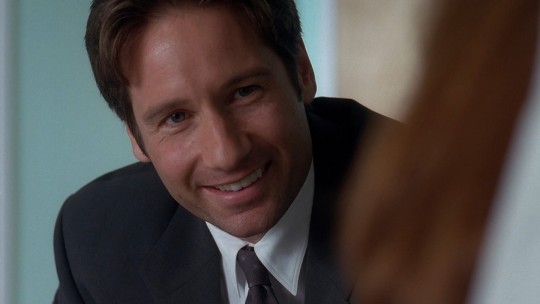
this is my favorite line delivery of the series. it carries so much weight. he hasn't stopped smiling at her the entire time she's been in the hospital, trying to alleviate how much she worries about leaving him alone, and at times it is forced, but not here.
when he tells her that he was lost the night before, but found his way when he was with her. and explains to her the situation that he is in, the choice that he's been given, the decision that he's made. and she asks why he came to see her if he'd already made up his mind.
the way that he laughs and chokes through tears at the same time when he responds, "because i knew you'd talk me out of it if i was making a mistake."
it's almost ridiculous to say out loud, in the end, because it's the end. it's a foregone conclusion, and it's so so limited.
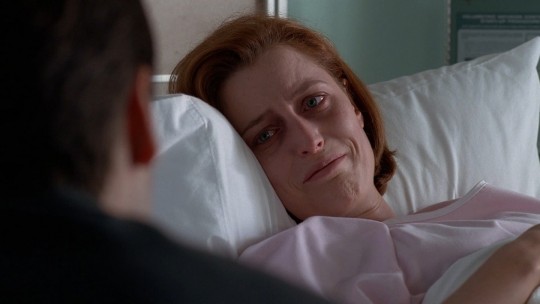
the look on her face says so much. there is so much grief in being needed. it doesn't last forever. it might not even last the rest of the day, she might not live long enough to ever find out if he's walking into that hearing to make a mistake. how can either of them do anything but cry and laugh in the face of that??
she's on her deathbed and he's flashing that smile at her so maybe she won't worry, like he did when he knelt before her in a surveillance unit and handed over his gun, a lifetime (or two years) before, trying to make it all okay. but how could it be okay when this person needs her like this? when it's all so fragile? when tomorrow, maybe, there won't be anyone to listen to him and tell him if he's making a mistake.
it aches to be depended on.
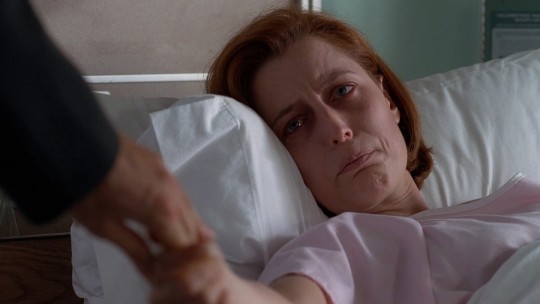
"you are going to die in your best friend's arms. and you play along because it's funny, because it's written down, because you've memorized it, it's all you know." (richard siken planet of love)
she's going to die in her best friend's arms, and it's funny, because what is there to do except choke out a laugh through tears?
2/ sein und zeit - "she was trying to tell you to stop"

this is tough as nails love.
this is the dirty work that no one can bear. this is being willing to tell someone what they need to hear, and to stay for the fallout.
i love this episode, and this whole scene is such an intense and important moment in who their characters are.
she gets down on the floor. she looks him in the eye and tells him the truth, even when her voice wavers. she holds steady in the midst of his lashing out, his eruptive grief, his inability to accept the facts that she cut through skin and bone to find. she grabs him and holds him tight and rocks him on the ground.
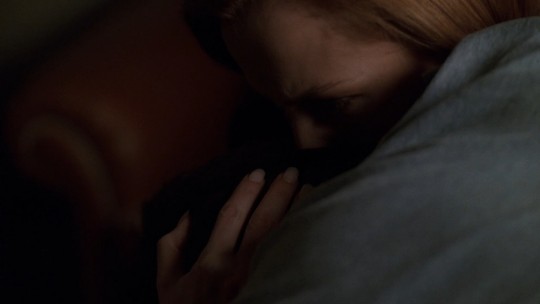
i always think of this quote from audries' throat, eye, and knucklebone:
"Sometimes she wishes he’d get some kind of universal object permanence. Actually practice the world-weariness he preaches with his tired eyes and dingy kitchen. Learn to anticipate the punch or else to slip and roll with it. It’s all incongruent - leaves her there cursing God and rocking him on the floor and all the while thinking you should know better at no one in particular."
mulder, who at 12-years-old, closed his eyes every time he walked into his room, because maybe his sister would be there when he opened them.
who looks up at stars and sees wandering souls, who can spin any light in the sky or water in an autopsy report into a reason why the world is still kind, despite all to the contrary. for whom "trust no one" is little more than a computer password, because he listens to everyone, believes everyone has something important to say, even cold answering machines.
he wants to believe, he comes into every situation with a bad joke and the most hopeful answer, he is rarely wrong. he still walks into every room with his eyes shut tight.
and what a thing to dedicate your life to, to spend your days with someone who sees the world this way. except, what happens when even the most complex spins and intricate theories cannot account for the dull sharp reality of loss? when there are certain things that are just too awful to be explained.
he should know better. one of them should, at least, but sometimes when you walk into every room with the most hopeful answer, you're wrong. sometimes there's just no evidence or conspiracy or mythos to be dreamed up.
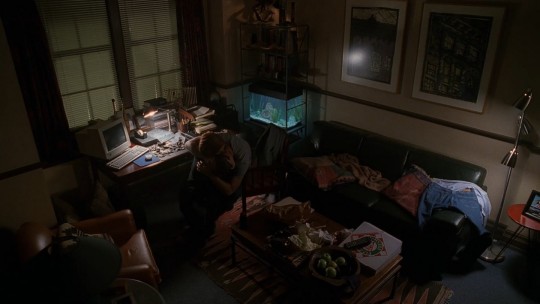
his mother killed herself. she did so without saying goodbye, without telling him the "unsaid" truths she's kept secret, without leaving anything more than burnt photos of him in the trash and a message on his answering machine about how he didn't call her back. a message that he can rewind and replay a thousand times over, it still won't hold any answers. he still won't be able to figure this out.
it's horrible and painful and devastatingly human, with no grander purpose to it, and he should know better than to look. after everything that he's seen and lost and been through, he should have retained some understanding that this is the world.
but he looks anyway, with as much dedication and hope as he does everything, and there is no one there other than scully to say stop. to say this is the truth. to say these are the facts.
there is no one there other than scully for him to run up against, and she sits calmly and holds onto him.
she tells him the truth, and she tells him something else, too. she tells him that his mother wanted to tell him to let go, that she wanted to "take away his pain."
which...maybe this is true, or rather, maybe scully believes this. but scully stood in the next room when his inquiries to his mother got him little more than a slap to the face.
scully watched on tape as tena signed her son over to the devil, a hospital pen in her hand and cigarette smoke framing her face. scully's heard this voice on an answering machine too, and she never got a response either.
there's so much pain in her face as she tells him, through tears, that his mother just wanted to take his away. her own version of shut eyes and a strategic spin, this is what she has to offer.
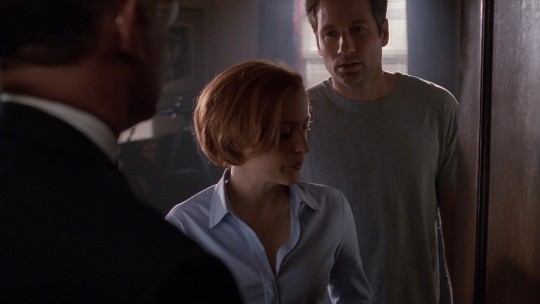
in the following scene, it's morning now, and scully answers the door with her hair frazzled, still wearing her blouse from the day before but not her blazer.
weary from a night spent confronting the punches of the world, she's visibly exhausted when she looks at skinner and says, "it's been a hard night for him."
when mulder comes to the door, she never moves from her place in front of him, blocking him in. (she has always shared him with the world only reluctantly). as skinner tells mulder that the mother of the missing little girl in california has something to say, and she will only talk to him.
sometimes, when the worst happens, you want the person with the most hopeful answer.
skinner tells him that he's booked them two flights, and after mulder nods and walks away to get ready, scully looks at her boss and tells him that he "better book three."
tough as nails!
3/ the erlenmeyer flask - "mulder? i just want to say that i was wrong."
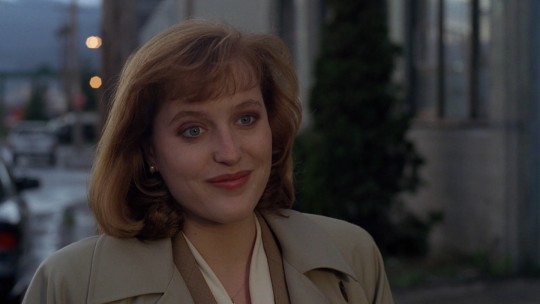
this moment exemplifies so much of their relationship in season one, and this is my favorite MSR. baby-faced and curious and overjoyed to know each other. they are best friends.
no one else would run up behind him on the street and stop him to tell him they were wrong, and that they should have believed him. it means so much.
when she tells him that she should have just trusted his instincts, and he replies, "why? no one else does." and she just smiles at him...season one scully has found secret treasure no one knows about. she can't believe she's getting away with hiding him in the basement.
4/ paper hearts - "but i do know you"
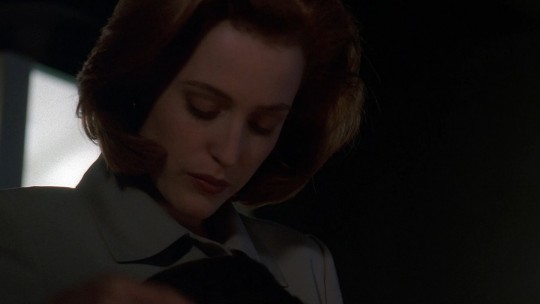
it's about THE INHERENT GRIEF IN BEING NEEDED!! of course a paper hearts moment was going to land on this list somewhere. my attachment to this episode knows no bounds. i could bring it into anything.
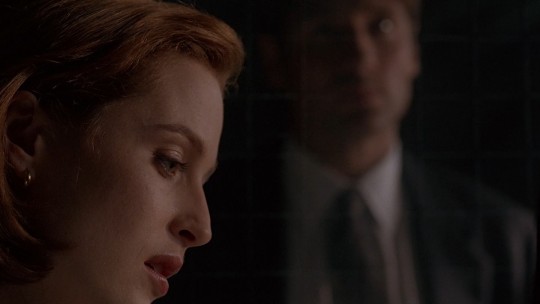
paper hearts is an ahab and starbuck episode. mulder is more haunted than we ever see him, as he spends the hour grasping at ghosts. scully's place in this episode is everything that makes her role so important, as she tries to balance hope and rationality. this is their quest, and these are their skeletons.
earlier, when roche tells mulder that he just wants to see his face when he finds samantha's body, you hear scully exclaim "oh my god" before standing up and screaming at him, opening the door and just getting mulder out.
she tries to reason, she tries to rationalize, she tries to get him away from "the darkness", but when it comes down to it, she digs in the dirt next to him with her bare hands.
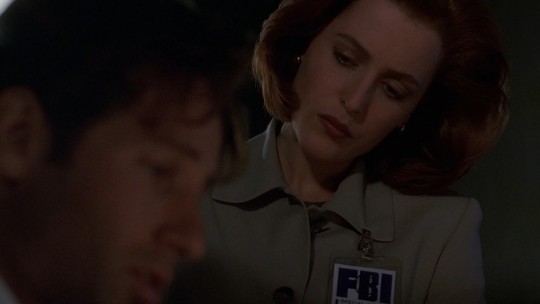
i love these little moments that they always share in the end, when it's all over. there's nothing more to be done. all that's left is a tattered scrap of fabric with weary eyes looking on. she just comes in to check on him.
she gives him the results of the labs on the last heart, how there's nothing to go on, and then she tells him that they will find who that last little girl was. when he asks how, she replies that she doesn't know, "but i do know you."
this is their quest. they will find all of the victims, give the families the answers that mulder so desperately wants for his own. she doesn't know how, she just knows him, and that's enough to believe.
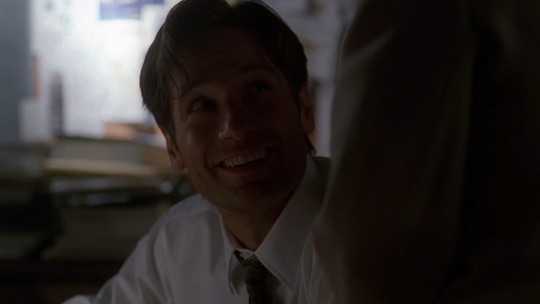
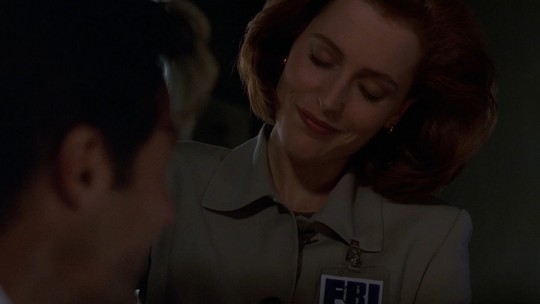
when she tells him to "go on home and get some sleep," all he can do is laugh. after all of the heartache and tension in this episode, how brutally visceral the pain of it all is, it melts away in the incredulousness of her suggestion.
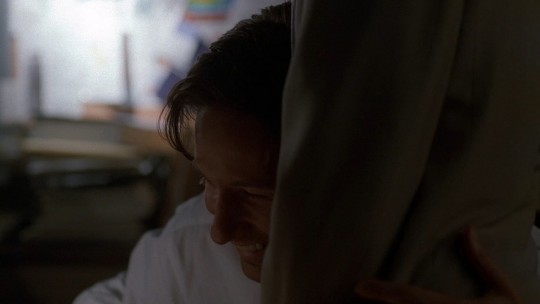
he flashes that smile and hugs her, "thank you" and "i'll be okay" at the same time
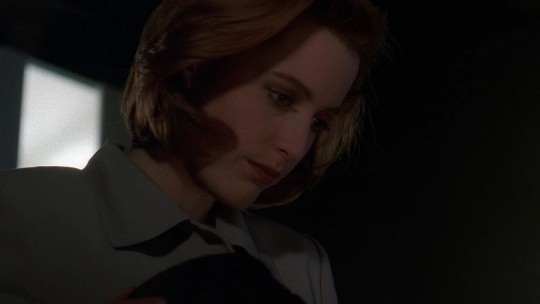
and she strokes his hair and stares at the floor.
the grief in being needed. (who would come make sure he's okay if she were gone?). the grief in following ghosts. (there has never been a more brutal reminder that samantha was more than the photo in that frame). the grief in loving someone so encased in pain and loss. (he will not go on home and get some sleep).
there's so much grief in being starbuck, in the end.
5/ how the ghosts stole christmas - "maybe i did wanna be out there with you"
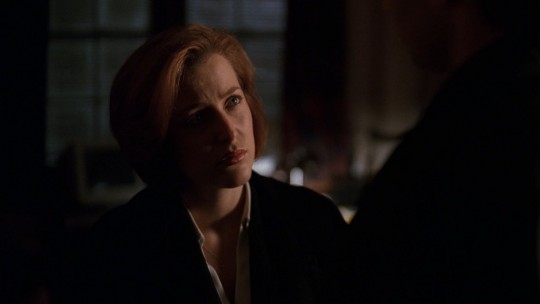
is there any better representation of season 6 than hanging out with a movie after a night of some light murder/suicide plans?
this episode is just the best. and one of the things that makes it so good is that it's comedy is rooted in examination, in bringing mulder and scully's psyches into question and condemnation.
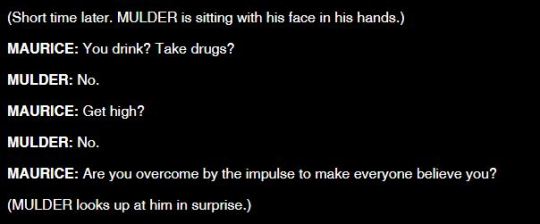
😭😭😭😭
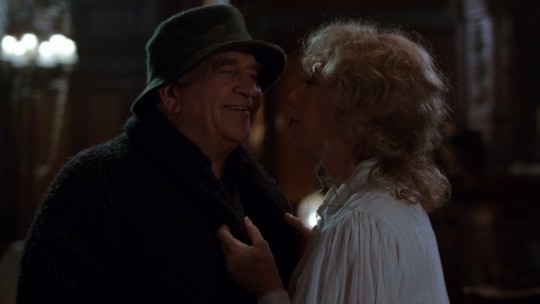
having only christmas eve to keep up their reputation, our titular ghosts, lyda and maurice, are forced to resort to "pop psychology" to fulfill their haunting. they have no idea the gold mine that stumbled into their house this year.

instantly upon meeting, maurice WHACKS mulder, calling him "narcissistic," "overzealous," "self-righteous," and prone to obsessive compulsive antisocialism

a lonely man who considers himself passionate and misunderstood, but chases illusions in order to find warped meaning and significance

meanwhile, in the next room, scully is not safe from disturbance, as lyda calls out her "conflicted yearnings" and delusions of loyalty. the reason why she's "really here"- for the satisfaction of proving her partner wrong.
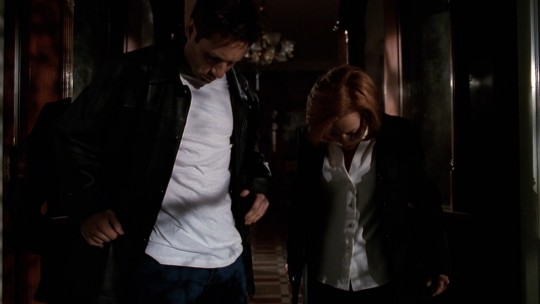
in the end, mulder and scully escape the house only by realizing that the ghosts don't actually have any power over them. it's all an illusion, it's not real, and lyda and maurice can't hurt them- or make them hurt each other.
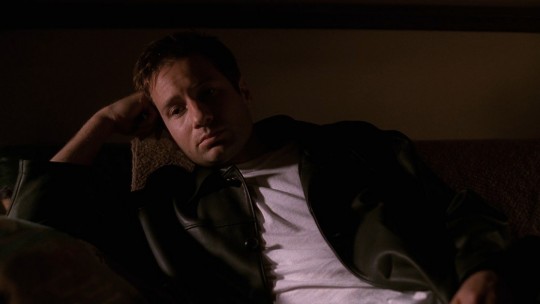
but it doesn't stop them from internalizing the messages of their haunted house, and mulder spends christmas alone watching a christmas carol, as the scene opens on him listening to scrooge say the line, "i don't deserve to be so happy."
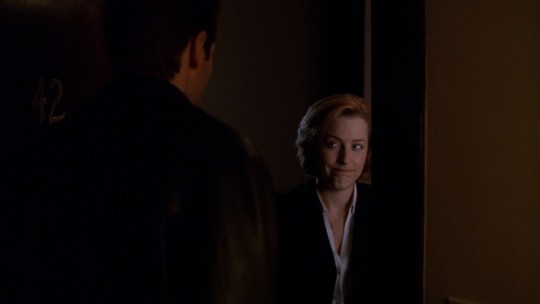
also unable to shake the events of the night, scully shows up

and asks if any of that was real. if it was just an illusion. which, always knowing when to back down on the need for belief, mulder gives her, agreeing with her that it must have just been in their heads. (folie a deux, she is always more comfortable in shared madness with him than with the world.)
after having been dragged out on christmas eve to look for ghosts, finding them, and then deciding that it was all shared delusion: she repeats back the insecurity that lyda gave her, "not that my only joy in life is proving you wrong."
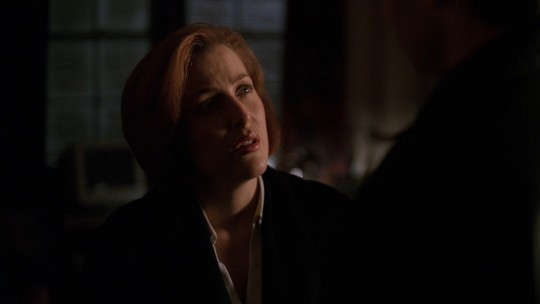
but after coming inside, she betrays her true insecurity. responding to mulder's "when have you ever proved me wrong?" with "well...why else would you want me out there with you?"
why else would he want to spend christmas eve with her, why else would he want her with him, if not to play her role? if not to offer the "science and rationalism" that he told her, not too long ago, saves him?
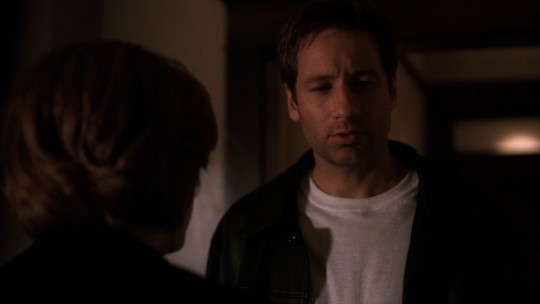
"you didn't want to be there? oh, that's...self-righteous and narcissistic of me to say, isn't it?"
god, they are both so slow.
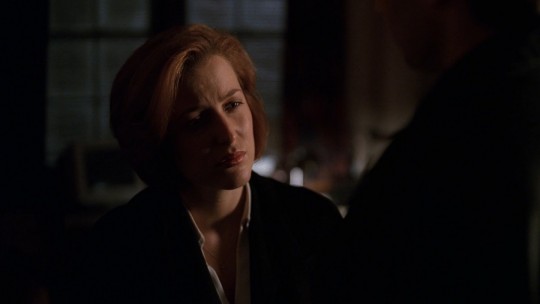
they both consider for a moment, these roles they play. these "subconscious desires" that they mask in their own personal pursuits. how easy it is to turn them against themselves, to expose their uncertainties and weaponize them.
before scully lands on, "no, i mean...maybe i did want to be out there with you.”
and they exchange the christmas presents they totally swore they weren't gonna get each other this year.
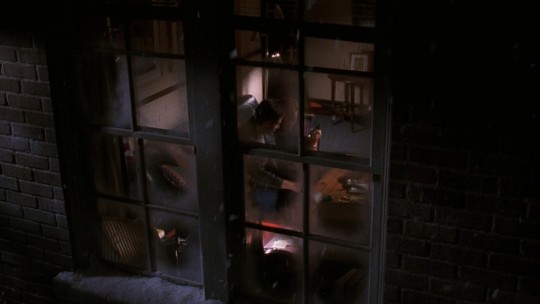
maybe they do just want to be out there together.
maybe it's not about grand perceptions of loyalty or meaning. maybe it's not about the parts that they play. maybe it's not about obligation or dependency. maybe they just want to.
#thank you again for the ask#lots of love#asks#kae meta#txf#msr#redux ii#sein und zeit#the erlenmeyer flask#paper hearts#how the ghosts stole christmas
95 notes
·
View notes
Text
I’m not going to bother blocking (believe it or not, I agree with some of your posts, and I don’t enjoy cutting off discussions) but I also am not giving anymore notes to the post, particularly when the “very open to discussion” person blocks and hides people attempting to add to the discussion. They also seem quite agitated with me and said they’d block me if I interacted again, so!
We're normally a long post to be in detail about our points and topics we get, or small generalized posts with 0 to no explanation at all because we're tired or some other shit that makes us be lazy and don't talk in depth in a a topic
And that is absolutely fair! We do the same — quick, over generalized posts. The difference is, we 1) try to make those posts as open ended as possible, or open to others experiences as possible, and 2) we accept the criticism of others when they tell us it’s over generalized.
All my response was was a criticism pointing out the flaws in the over generalization, because I think your over generalization was absolutely heinous, and is used constantly to discredit singlets from a discussion that I find them vital to.
In all the topics, not only surrounding system topics/syscourse the generalization don't talk about all the cases, there's a lot of "it depends" in every topic you can imagine, we firmly believe that the best answer to any topic regarding the topic is "it depends" but we're just too lazy to elaborate sometimes, that's why in the repost we did you may see some "incongruences", it's just we did talk in more depth, we're just lazy lol
K. “I’m just lazy” really isn’t the best defense you think it is. I’m glad you can acknowledge that you over generalized, but at that point, I think it’s fair to accept criticism from others for that laziness. Syscourse is a high-octane conversation with nuance and depth; not a quick post you fling out from your bed in 5 seconds with no thought because you’re lazy.
I get it, I do; I’m currently sick with at least 4 different illnesses and I don’t have a lot of spoons. But I can still debate. I can still raise valuable points and dedicate time to things. Hell, my response to your originally was lazy, because I relied on the thing I find easiest — sarcasm — to discredit your point, hoping the slap to the face bluntness might get through to you the point. That obviously didn’t work! It typically does for my 11 year old students, so I guess that’s on me for assuming you’d react to sarcasm similarly.
So yeah, we tend to generalize and be short with no explanation sometimes, you just happened to encounter one of that posts, but those post are completely open to civil discussion, in those cases we do prefer not to quote the first post because it's a lazy generalized why of our opinion. I say this to have in mind for future references with our posts, if we're gonna talk in depth of this topics we might seem hypocrite or incongruent for this exact reason
Thank goodness this is a civil discussion then! So was sysmedsaresexist’s reply, but you still blocked that discussion. Unless by “civil” you mean “must concede points to me, even if they disagree with me, and must not sound angry at all.” In which case — yeah no, I have dampened my anger far too much in syscourse to allow some rando who’s spouting non-nuanced nonsense to earn my silence.
I’m allowed to be pissed off at non-nuanced posts. I’m allowed to be upset at things that further the split between singlets and systems in the system community! (Though, thank you, because as this is my last response to this particular post, it’s helped me realize I can dedicate this frustration toward yet another post about singlets and how much benefit they have in system discussions!)
“Civility” is a concept that doesn’t make sense to me in these situations. I’m never sure what someone means. From my perspective, I’ve been civil. I’ve also been insulting and mean. I’ve also criticized neutrally. I’ve done all those things! That’s all still civil to me. I didn’t harass you, I didn’t blast you on my blog — I just reblogged your points (which from my perspective encourage a dangerous mentality) and was mean about it. I think I’m well within my rights.
I do think is inappropriate to make a blog about syscourse if you're not a system, yeah, the problem might affect you because of people who are close to you and they might have some things to say about topics regarding system, but when it comes to syscourse most of the topics around it are about the community of systems that affects the community of systems, so a non-system talking about it it's just weird and doesn't have sence
You keep flip flopping. You described how it’s perfectly reasonable for my partner to participate in syscourse in the previous post, and now you say they shouldn’t, but with a new goal post added.
I disagree with you fundamentally about what syscourse is about. Syscourse falls into numerous topics. My partner primarily posts about respect and research into DID. Is it wrong of them to do so? I don’t think it is. But that is still posting directly to the tags, directly to systems, and into the syscourse community.
I don’t think that’s wrong.
They can talk about their experiences and how somethings do affect them, in the case is talking only experiences like I don't think that count as syscourse, and I also don't know that singlet's post so I can't really talk a lot about that
They talk about my experiences more. They ask I preview their posts but I wish they wouldn’t; I’ve never had to change a word beyond showing them how to tag things.
I’m not sure why you don’t count it as syscourse when it blatantly is from my perspective. As always, a debate boils down to a difference in definitions. You’re clearly defining syscourse as something other than “a tag on tumblr (or on other social media, but for this conversation, tumblr) that is dedicated to discussions about system discourse.” Anyone can have a discussion.
We also have singlet friends who are normally involved and affected into syscourse or system like topics, but they recognize entering to syscourse isn't right
I wonder how much of that is because their friend puts posts out explaining how awful it is for singlets to post in syscourse…
I encouraged my partner to make a blog because they’ve helped me so much to understand my own systemhood. I needed their perspective to be where I am now. Non-nuanced posts like yours lead singlets to avoid these spaces and systems to believe that’s a good thing. That’s what I was fighting against.
Don't get what you're saying here except you like to do the same shit you claim I do lol, also wtf is "The Other Side"??
Okay, let me explain in more depth then:
I saw your very non-nuanced post and thought, “God, not this shit again. We see this constantly. I do not have spoons or energy to explain yet again, in detail, all of the reasons this is wrong. So I’m going to respond with sarcasm, since that’s easier, and explain how they are wrong that way.” This wasn’t lacking nuance; it was just a different way of tackling a lack of energy.
My response to you was brief — there’s nothing wrong with low energy posts, and I’m not sure where you got that from in my response. The issue is over generalizing your ideas in such a way as to demonize A Side — the “Other Side.” In these spaces, there’s always two sides in the debate: Your Side, and the Other Side. I sit in a nebulous “both sides” nearly at all times, and it often seems like your posts are trying that — but in this case, Your Side is Systems In Syscourse and the Other Side is Singlets in Syscourse. One is right and one is wrong, one is black and the other is white, and there’s no swaying your opinion.
You saw a post from the Other Side — a singlet in syscourse or someone supporting singlets in syscourse — and it pissed you off enough to post a non-nuanced vaguepost. If you wanted to use low energy while keeping the nuance, you could’ve said, “Posts like X piss me off because it doesn’t feel like OP has enough experience with systems to participate.” But given that your whole issue is just… singlets having a DNI on their posts or a stance on their blog (based on the OG post you mentioned,) it came across as “Singlets having any opinion about system stuff online is bad.”
Combine that with a non-nuanced “singlets aren’t allowed to syscourse” blanket statement, and that’s what I have issue with.
Does that make more sense?
Didn't say that, if you understand that is a you problem, what I did meant to say it's you can engage but don't do it in a way that isn't outside a third eye perspective, the topics aren't about you, you might be affected to them but aren't about you, so the best if you wanna enter is to doing in a respectful way
Okay, so this wasn’t clear due to how non-nuanced your original post was. If you wanted to say this, then you should’ve said it. If you didn’t have the energy to say it, then don’t fucking post it. You need to be clear about your words. Like, let’s refresh ourselves on what you said:
When you're directly affected by that is obvious that you can have an opinion, and ofc it's gonna impact your online life if it impacts your irl live, but because of that it doesn't mean singlets should be actively entering in syscourse/system topics
“That doesn’t mean singlets should be actively entering syscourse/system topics” has become “If you want to enter syscourse topics, you need to do so in a specific way and be respectful.” Do you understand how different these two things are? Do you understand how it’s not a “me” problem when I am literally reading the words in front of me as they are?
They're not affected in the same way a system would be affected, they can be affected ofc, we said that in the post, read it again please, so yeah, dk what you want us to say in this part
What I want you to explain is how they are not affected the same was a system is affected. Because from my experience, they are.
I am stressed out by syscourse. So is my fiancé. I am triggered by syscourse. So is my fiancé. I have insights into systemhood and how it impacts both me and those around me, and so does my fiancé. In all of your responses, you’ve still failed to address that discrepancy; why should singlets not participate?
The most you’ve said is “they aren’t affected the same way,” but that’s so nebulous and uncertain and denotes nothing. My partner is affected in the same way! I don’t understand why you won’t take my word for that through all of this.
It's obvious people are gonna have other things outside their professions, that's common knwoledge genius, again, I don't get your point in somethin so obvious that you can't make out
“I don’t get your point.” My point is, there are so many therapists and medical professionals who participate in syscourse, which goes against your original claim. I’m uncertain how you missed that. Maybe it’s because you just flat out blocked SAS’s response about that topic? They spoke at length about those medical professionals. I would suggest reading that blocked reblog for some more perspective.
I'm not even gonna try to talk about the other things you say because it's just nonsence shit and you justwanting to attack me or shit like that, you're simply being someone inmature and I see you really open to civil talk, the main point of the blog here
“I’m not even going to try and address your other points because you’re just attacking me and immature, and I’m only interested in civil talk”
Pray tell, the other points I made are attacking you? How? I saw it as attacking your position. We’ve already discussed the “civility” thing (people are allowed to be mad, get used to it) but I see nowhere where I attacked you. I may have used some insulting language (I think I called your beliefs absurd at one point, so I could see how that would upset someone) but that doesn’t mean I wasn’t civil.
(The other points, for context, were further examples where singlets would have a place in these conversations, including final fused systems who choose to identify as singlets; these points are evidently attacking them.)
And I saw your posts, you don't care about breaking others boundaries, if you do that online what can I expect you do irl? Or you're just a incongruent hypocrite like you say I am? You don't want to engage in anythig real but hate and attack, and you see pround about that, or at least you don't see that as a real problem when it is, you're just bein an inmature hater
You mean my one post I’ve made, across around 7 years of syscourse at this point, saying I don’t really listen to DNIs anymore because they’re simply used to avoid discussion and spread misinformation?
Welcome to Ad Hominem, by the way! Why does what I do in my regular life matter? Why was that relevant to this discussion? (It’s not; it’s moralizing about me to try and demonize me because oof ouchie my words hurt your fee fees >;). To that point; I have written numerous posts about respect, understanding the other perspective, and the understanding of consent. I teach in my regular life how boundaries are vital and that students need to set boundaries with their teachers and parents, especially as a traumatized individual who lacked boundaries.
What do you do?
don't have time for inmature people like you and that's why mid reblog I just gave up because people like you can't appeal to civil disccusion which, again, is what this blog is about. And even with almost no boundarie and DNI you still manage to break it, I'm impressed in a bad way
Again. “Civility” is being defined by you were very differently than by me. Hilarious.
For me you're just a little hypocrite hater inmature and a bad person, other people might not see you as a bad person? Good for them, I don't fucking care, you care that I see you as a bad person? It's a you problem that I couldn't care less, you see me as a bad person? Good for you, it's the lastthing I would care tbh
I have to be perfectly honest, I can’t interpret this.
It seems like you just calling me an immature bad person? Not sure how that’s relevant to the discussion. We’ve just resorted to playground name calling it seems.
I really do not care if you see me as a bad person, and I certainly don’t see you as one. Not really sure where that came from, to be honest. What a non sequitur.
I can't have a real talk with someone like you so this "talk" ends up here, if you respond with another repost I'll just ignore it and block you, I recommend you ignoring me from now on, or if it helps your black hater heart block me, demostrate you can be mature shall we?
“If you reblog” (not repost, we use different language on tumblr) “I’ll ignore you and block you, or you can be mature and block me first.”
…
You still haven’t blocked me ._. ? Like. Okay, you know you don’t have to wait, right? You could’ve done so at any time.
I haven’t blocked you because I don’t feel the need; I enjoy conversations and the ability to see other perspectives. It’s just that your perspective is unclear. You’ve still not explained any differences that would necessitate that singlets not participate in syscourse, whereas I’ve explained in each of my posts situations where singlets would be welcomed. A vague “it doesn’t affect them” isn’t enough.
But sure; please feel free to block me and have any sort of opinion about me. Lord knows you’re not going to be remembered. The amnesia does that to me lol.
Have a good day!
#there’s my word count for the day lol#as I’ve mentioned I’m incredibly sick so please have patience with spelling and grammar#vessel on a calming sea#singlet syscourse#syscourse
9 notes
·
View notes
Text
Week ending: 25th June
Well, it's been a while since we heard from Joan Regan - four whole years, in fact! And to tell the truth, I didn't expect to hear from her again - in my mind, she's definitely a pre-rock and roll artist. Still, it's nice to see some of the old guard still making it into the top 10, on occasion. If nothing else, it breaks the charts up, a bit! Plus, I sneakily quite like this number - there's a charm to it that kind of snuck up on me, you know?
May You Always - Joan Regan (peaked at Number 9)
This is a distinctly old-fashioned song - it's got that dignified "Broadway classic from the 1920s or 30s" vibe that you used to hear a lot, back in, say, 1954. In fact, upon hearing it, I assumed, straight-up, that this was an old standard. But no, this song was written only a year ago in 1958, and doesn't seem to have originated in a musical, as far as I can tell. It's just got that vibe to it - helped, I think, by the liberal use of orchestral instruments, and by Joan's very clear, mannered enunciation, which really does feel like she could be singing the song on stage, or for a film soundtrack.
I kind of like it, honestly. Joan really does have a lovely, warm voice, and there's something a little jazzy about the tune, in the way it just slinks along, with a faint piano backing, a subtle bit of clarinet here and there, a swell of strings. There's a wistfulness to it. And the lyrics are great, too - it's a sort of blessing, as Joan wishes her love well, praying that may you always walk in sunshine, / Slumber warm when night winds blow, / May you always live with laughter, / For a smile becomes you so. They're sweet lyrics, sweet enough that I want to keep quoting them as Joan hopes that may good fortune find your doorway, / May the bluebird sing your song, / May no trouble travel your way, / May no worry stay too long. Heartwarming stuff, right there.
I think this probably explains why the song was a hit, actually. Style-wise, this song may be old-fashioned, but make a song sentimental enough, especially if you can do it without getting mawkish, and you've got a hit on your hands that the British public will absolutely lap up. And that's before you get to verse three, where you think "huh, the tune here sounds a bit like Auld Lang Syne". Which is 100% deliberate, leading into lines wishing that may old acquaintance be remembered / And your cup of kindness filled. So yeah, we've got references now to Auld Lang Syne, too, itself a very nostalgic song, and one that probably has all sort of emotional resonance for your average Brit, tied up as it is with New Year's and late night tipsiness, and memories of old friends you maybe haven't seen for a while.
And finally, you hit verse four, which is the wistful cherry on an already stunningly sentimental cake, as Joan prays that may you always be a dreamer / May your wildest dream come true / May you find someone to love / As much as I love you. All of a sudden, this has gone from a song about just wishing somebody well, generally, to being a song about unrequited love, and about wishing somebody well even as they don't seem to love you back. Which is kind of heartbreaking - a very musical theatre sentiment. Joan's the Eponine, suddenly, a sort of tragically gracious romantic loser. And I'm not ashamed to admit that I genuinely find it touching - call me emotionally manipulable, but I just think there's something very lovely in it, and the way the song gradualy works its way to this melancholy, bittersweet ending.
I really liked this song, if you can't tell. I think back in 1954, or whenever Joan was last scoring hits, I'd have found it a bit much, just another sentimental ballad among many similar ones. But in the otherwise rock and roll-dominated wilds of 1959, it's a welcome diversion, a cosy New Years cup of hot chocolate, raised in an affectionate toast to the one who got away. It's a bit incongruous, but I can 100% see the appeal. And that's the main thing, right?
Most sappily heartwarming song of the bunch: May You Always
0 notes
Text
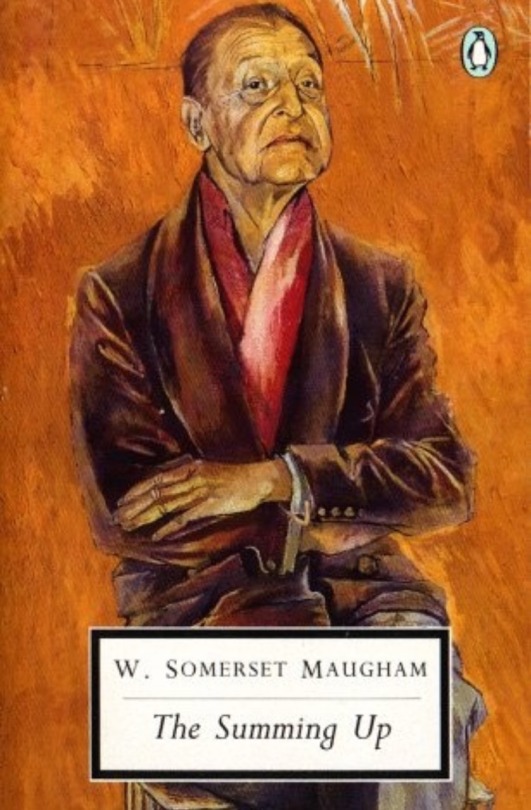
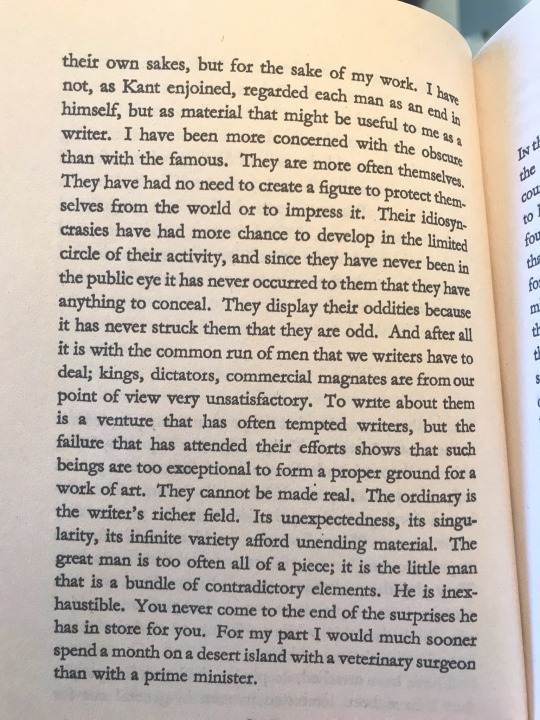
The Summing Up by Somerset Maugham, 1938. This is a literary memoir in which he shares his experience regarding literature, theater, creative writing, literary criticism, philosophy, and religion. I wasn’t familiar with some of the authors and philosophers he referred to, but overall it’s edifying for those interested in the writing life and fans of Maugham
Memorable quotes and excerpts:
It must be that to govern a nation you need a specific talent and that this may very well exist without general ability. p3-4
His explanation why ordinary lives rather than famous ones make the better subject for writing makes perfect sense. p6 (see photo)
If he (the reader) has the patience to read what follows he will see that there is only one thing about which I am certain, and this is that there is very little about which one can be certain.
His typist’s unsolicited grammatical corrections of his draft of Cakes and Ale are hilarious. p19-20
He speaks of 3 elements he strives to accomplish in his writing: lucidity, simplicity and euphony. The analysis of obscurity in writing is interesting and scathing. p30-32
The following excerpt is redolent of Graham Greene. I read a fragment online that Greene reviewed The Summing Up in 1938, but I couldn’t read the article due to a paywall. Even if Greene had taken Maugham’s observations to heart and used them for his novels, it doesn’t take away from Greene’s execution of this theme in his novels.
I think what has chiefly struck me in human beings is their lack of consistency. I have never seen people all of a piece. It has amazed me that the most incongruous traits should exist in the same person and for all that yield a plausible harmony. I have often asked myself how characteristics, seemingly irreconcilable, can exist in the same person. I have known crooks who are capable of self sacrifice, sneak thieves who were sweet natured and harlots for whom it was a point of honor to give good value for money... It must be a fault in me that I am not gravely shocked at the sins of others unless they personally affect me, and even when they do I have learnt at last generally to excuse them. It is meet not to expect too much of others. You should be grateful when they treat you well, but unperturbed when they treat you ill. ‘For every one of us,’ as the Athenian stranger said, ‘is made pretty much what he is by the bent of his desires and the nature of his soul.’ It is want of imagination that prevents people from seeing things from any point of view but their own, and it is unreasonable to be angry with them because they lack this faculty… There is nothing more beautiful than goodness, and it has pleased me very often to show how much of it there is in person who by common standards would be relentlessly condemned. I have shown it because I’ve seen it. It has seemed to me sometimes to shine more brightly in them because it was surrounded by the darkness of sin. I take the goodness of the good for granted, and I am amused when I discover their defects or their vices; I am touched when I see the goodness of the wicked, and I’m willing enough to shrug a tolerant shoulder at their wickedness. I am not my brother’s keeper. I cannot bring myself to judge my fellows; I am content to observe them. My observation has led me to believe that, all in all, there’s not so much difference between the good and the bad as the moralists would have us believe. p55-57
His view on religion starts on p242. And restarts on 261.
1 note
·
View note
Note
hello there, hope you're having a nice day <3
so i've been reading a lot of fics lately, uk for sanity's sake, and i've noticed that in most of them, lwj doesn't use contractions (eg., says do not instead of don't)?? and i think he doesn't in the novel either but i don't remember lol so i can't be sure but anyway that made me curious - does chinese have contractions as well? does he not use it bc it's informal?
hello there! I’m doing all right, i started to answer this ask while waiting for a jingyeast loaf to come out of the oven 😊 many thanks to @bookofstars for helping me look over/edit/correct this post!! :D
anyways! the answer to your questions are complicated (of course it is when is anything simple with me), so let’s see if I can break it down--you’re asking a) whether chinese has contractions, b) if it does, how does they change the tone of the sentence--is it similar to english or no?, and c) how does this all end up with lan wangji pretty much never using contractions in english fic/translation?
I’m gonna start by talking about how formality is (generally) expressed in each language, and hopefully, by the end of this post, all the questions will have been answered in one way or another. so: chinese and english express variations in formality/register differently, oftentimes in ways that run contrary to one another. I am, as always, neither a linguist nor an expert in chinese and english uhhh sociological grammar? for lack of a better word. I’m speaking from my own experience and knowledge :D
so with a character like lan wangji, it makes perfect sense in english to write his dialogue without contractions, as contractions are considered informal or colloquial. I don’t know if this has changed in recent years, but I was always taught in school to never use contractions in my academic papers.
However! not using contractions necessarily extends the length of the sentence: “do not” takes longer to say than “don’t”, “cannot” is longer than “can’t” etc. in english, formality is often correlated with sentence length: the longest way you can say something ends up sounding the most formal. for a very simplified example, take this progression from least formal to absurdly formal:
whatcha doin’?
what’re you doing?
what are you doing? [standard colloquial]
may I ask what you are doing?
might I inquire as to what you are doing?
excuse me, but might I inquire as to what you are doing?
pardon my intrusion, but might I inquire as to what you are doing?
please pardon my intrusion, but might inquire as to the nature of your current actions?
this is obviously a somewhat overwrought example, but you get the point. oftentimes, the longer, more complex, more indirect sentence constructions indicate a greater formality, often because there is a simultaneous decreasing of certainty. downplaying the speaker’s certainty can show deference (or weakness) in english, while certainty tends to show authority/confidence (or aggression/rudeness).
different words also carry different implications of formality—in the example, I switched “excuse me” to “pardon me” during one of the step ups. pardon (to me at least) feels like a more formal word than “excuse”. Similarly, “inquire” is more formal than “ask” etc. I suspect that at least some of what makes one word seem more formal than one of its synonyms has to do with etymology. many of english’s most formal/academic words come from latin (which also tends to have longer words generally!), while our personal/colloquial words tend to have germanic origins (inquire [latin] vs ask [germanic]).
you’ll also notice that changing a more direct sentence structure (“may I ask what”) to a more indirect one (“might I inquire as to”) also jumps a register. a lot of english is like this — you can complicate simple direct sentences by switching the way you use the verbs/how many auxiliaries you use etc.
THE POINT IS: with regards to english, more formal sentence structures are often (not always) longer and more indirect than informal ones. this leads us to a problem with a character like lan wangji.
lan wangji is canonically very taciturn. if he can express his meaning in two words rather than three, then he will. and chinese allows for this—in extreme ways. if you haven’t already read @hunxi-guilai’s post on linguistic register (in CQL only, but it’s applicable across the board), I would start there because haha! I certainly do Not have a degree in Classical Chinese lit and she does a great job. :D
you can see from the examples that hunxi chose that often, longer sentences tend to be more informal in chinese (not always, which I’ll circle back to at the end lol). Colloquial chinese makes use of helping particles to indicate tone and meaning, as is shown in wei wuxian’s dialogue. and, as hunxi explained, those particles are largely absent from lan wangji’s speech pattern. chinese isn’t built of “words” in the way English is—each character is less a word and more a morpheme—and the language allows for a lot of information to be encoded in one character. a single character can often stand for a phrase within a sentence without sacrificing either meaning or formality. lan wangji makes ample use of this in order to express himself in the fewest syllables possible.
so this obviously leads to an incongruity when trying to translate his dialogue or capture his voice in English: shorter sentences are usually more direct by nature, and directness/certainty is often construed as rudeness -- but it might seem strange to see lan wangji’s dialogue full of longer sentences while the narration explicitly says that he uses very short sentences. so what happens is that many english fic writers extrapolated this into creating an english speech pattern for lan wangji that reads oddly. they’ll have lan wangji speak in grammatically incoherent fragments that distill his intended thought because they’re trying to recreate his succinctness. unfortunately, English doesn’t have as much freedom as Chinese does in this way, and it results in lan wangji sounding as if he has some kind of linguistic impediment and/or as if he’s being unspeakably rude in certain situations. In reality, lan wangji’s speech is perfectly polite for a young member of the gentry (though he’s still terribly rude in other ways lol). he speaks in full, and honestly, quite eloquent sentences.
hunxi’s post already has a lot of examples, but I figure I’ll do one as well focused on the specifics of this post.
I’m going to use this exchange from chapter 63 between the twin jades because I think it’s a pretty simple way to illustrate what I’m talking about:
蓝曦臣道:“你亲眼所���?”
蓝忘机道:“他亲眼所见。”
蓝曦臣道:“你相信他?”
蓝忘机道:“信。”
[...] 蓝曦臣道:“那么金光瑶呢?”
蓝忘机道:“不可信。”
my translation:
Lan Xichen said, “You saw it with your own eyes?”
Lan Wangji said, “He saw it with his own eyes.”
Lan Xichen said, “You believe him?”
Lan Wangji said, “I believe him.”
[...] Lan Xichen said, “Then what about Jin Guangyao?”
Lan Wangji said, “He cannot be believed.”
you can see how much longer the (pretty literal) english translations are! every single line of dialogue is expanded because things that can be omitted in chinese cannot be omitted in english without losing grammatical coherency. i‘ll break a few of them down:
Lan Xichen’s first line:
你 (you) 亲眼 (with one’s own eyes) 所 (literary auxiliary) 见 (met/saw)?
idk but i love this line a lot lmao. it just has such an elegant feel to me, probably because I am an uncultured rube. anyways, you see here that he expressed his full thought in five characters.
if I were to rewrite this sentence into something much less formal/much more modern, I might have it become something like this:
你是自己看见的吗?
你 (you) 是 (to be) 自己 (oneself) 看见 (see) 的 (auxiliary) 吗 (interrogative particle)?
i suspect that this construction might even be somewhat childish? I’ve replaced every single formal part of the sentence with a more colloquial one. instead of 亲眼 i’ve used 自己, instead of 所见 i’ve used 看见的 and then also added an interrogative particle at the end for good measure (吗). To translate this, I would probably go with “Did you see it yourself?”
contained in this is also an example of how one character can represent a whole concept that can also be represented with two characters: 见 vs 看见. in this example, both mean “to see”. we’ll see it again in the next example as well:
in response to lan xichen’s, “you believe him?” --> 你 (you) 相信 (believe) 他 (him)? lan wangji answers with, “信” (believe).
chinese does not do yes or no questions in the same way that english does. there is no catch-all for yes or no, though there are general affirmative (是/有) and negative (不/没) characters. there are other affirmative/negative characters, but these are the ones that I believe are the most common and also the ones that you may see in response to yes or no questions on their own. (don’t quote me on that lol)
regardless, the way you respond to a yes or no question is often by repeating the verb phrase either in affirmative or negative. so here, when lan xichen asks if lan wangji believes wei wuxian, lan wangji responds “believe”. once again, you can see that one character can stand in for a concept that may also be expressed in two characters: 信 takes the place of 相信. lan wangji could have responded with “相信” just as well, but, true to his character, he didn’t because he didn’t need to. this is still a complete sentence. lan wangji has discarded the subject (I), the object (him), and also half the verb (相), and lost no meaning whatsoever. you can’t do this in english!
and onto the last exchange:
lan xichen: 那么 (then) 金光瑶 (jin guangyao) 呢 (what about)?
lan wangji: 不可 (cannot) 信 (believe)
you can actually see the contrast between the two brothers’ speech patterns even in this. lan xichen’s question is not quite as pared down as it could be. if it were wangji’s line instead, I would expect it to read simply “金光瑶呢?” which would just be “what about jin guangyao?” 那么 isn’t necessary to convey the core thought -- it’s just as how “then what about” is different than “what about”, but “then” is not necessary to the central question. if we wanted to keep the “then” aspect, you could still cut out 么 and it would be the same meaning as well.
a FINAL example of how something can be cut down just because I think examples are helpful:
“I don’t know” is usually given as 我不知道. (this is what nie huaisang says lol) It contains subject (我) and full verb (知道). you can pare this straight down to just 不知 and it would mean the same thing in the correct context. i think most of the characters do this at least once? it sounds more literary -- i don’t know that i would ever use it in everyday speech, but the fact remains that it’s a possibility. both could be translated as “I do not know” and it would be accurate.
ANYWAYS, getting all the way back to one of your original questions: does chinese have contractions? and the answer is like... kind of...?? but not really. there’s certainly slang/dialect variants that can be used in ways that are reminiscent of english contractions. the example I’m thinking of is the character 啥 (sha2) which can be used as slang in place of 什么 (shen2 me). (which means “what”)
so for a standard sentence of, 你在做什么? (what are you doing), you could shorten down to just 做啥? and the second construction is less formal than the first, but they mean the same thing.
other slang i can think of off the top of my head: 干嘛 (gan4 ma2) is also informal slang for “what are you doing”. and i think this is a regional thing, but you can also use 搞 (gao3) and 整 (zheng3) to mean “do” as well.
so in the same way that you can replace 什么 with 啥, you can replace 做 as well to get constructions like 搞啥 (gao3 sha2) and 整啥 (zheng3 sha2).
these are all different ways to say “what are you doing” lmao, and in this case, shorter is not, in fact, more formal.
woo! we made it to the end! I hope it was informative and helpful to you anon. :D
this is where I would normally throw my ko-fi, but instead, I’m actually going to link you to this fundraising post for an old fandom friend of mine. her house burned down mid-september and they could still use help if anyone can spare it! if this post would have moved you to buy me a ko-fi, please send that money to her family instead. :) rbs are also appreciated on the post itself. (* ´▽` *)
anyways, here’s the loaf jingyeast made :3 it was very tasty.

#mdzs#mdzs meta#the untamed#the untamed meta#lan wangji#lan wangji meta#mine#mymeta#linguistics#chinese#english#cyan chinese school#cyan help desk#languages#contractions#register#look man idk how am i gonna tag this#*yeets into the void*
1K notes
·
View notes
Text
The HeeBeeGeeBees Story In Angus Deayton's Own Meaningless Words
Posted by Tumblr User smarterthantheaverage via archive.org. Archived from the original (deleted) on 30 May 2009. Retrieved 2 May 2010.
There’s an episode of Have I Got News For You where, during the show’s final Caption Competition, a still is shown of three men dressed, false beards and all, as The Bee-Gees. This incongruity garners little audience laughter, until Paul Merton points out that the one in the middle is the show’s host, Angus Deayton. It is then realised that this is some sort of supposed practical joke played on Deayton, the show’s makers unexpectedly bringing up a silly-looking picture from his past, and the audience responds accordingly. Angus, knowing what is expected of him, feigns a look of embarrassment throughout.
But in reality, however, throughout this incident it is clear that Angus Deayton is not in the slightest bit embarrassed, except perhaps at the producer’s misjudgment regarding the prank. For this is not just a picture of a panel show host and his two friends dressed as The Bee Gees from a long time ago - this is a picture of The HeeBeeGeeBees, the Bee Gees-parodying band of which Deayton was a member for five years from 1979 to 1984. Angus Deayton is more than happy to recall publicly his time as a HeeBeeGeeBee - it’s just that, what with one scandal or another, no interviewer thinks to ask.
With a short exception. There was a fourteen-month period in Angus Deayton’s life, starting with him just becoming a household name due to the twin successes of KYTV and Have I Got News For You and lasting up to his first tabloid scandal, where journalists were keen to learn about this seemingly glamorous aspect of Deayton’s past life, and Deayton, having had over a decade to reflect on his unexpected pop career, was delighted to tell. This period ran from March 1992, when Deayton was a comedy star with KYTV series two starting on the 17th of March and the third series of Have I Got News For You, which that month won the BAFTA for Best Light Entertainment Programme, starting with an Election Special on the 9th of April, until May 1993, when Deayton messily left his partner of nine years Stephanie De Sykes, a singer best known for having a hit with Born With A Smile On My Face in 1974 after having sung it on Crossroads - she and Angus met during a Radio Active sketch in 1984. Here we quote the relevant extracts from those interviews (the sources of which can be found below) in their chronological order of events, and therefore for the first time give you the story of The HeeBeeGeeBees in Angus Deayton’s own meaningless words.
In his final year reading French and German at Oxford, Angus Deayton was invited to join the Oxford Revue by Richard Curtis. “Two people had to drop out, and just on the strength of meeting me, Richard asked if I wanted to be in it. [4] I never set foot on stage throughout my school days and never had any great feeling for it. It all materialised through meeting Richard Curtis, who writes Blackadder. He asked me to take part in the Oxford Revue when someone dropped out. Then it snowballed.” [3]
It was in this Revue that Deayton met, wrote and performed with Michael Fenton Stevens and Philip Pope. Of the latter, the primary song-writer of the trio, Angus has said: “He seemed to have an innate understanding of how to write a sketch and structure it. He’d go for jokes that were intrinsically funny, where I went for wordplay - my failing. He went by John Cleese’s three laws of comedy: no puns, no puns and no puns. Mind you, I say no puns… I think the only sketch we ever wrote with him was one that involved a man going into a police station and saying ‘I’d like to report that my car is missing’ and the policeman says ‘It’s probably the spark plug, sir’…” [5]
For the Oxford Revue the three of them formed The HeeBeeGeeBees. “It started as a sketch from the Oxford Revue, in Edinburgh in 1979. It involved three of us dressing up as the Gibb brothers and singing in silly voices. It was the best thing in the show. Two people from a record company in London came up and saw it, and, in the time-honoured tradition of fairy tales, signed us up. Unfortunately, it didn’t follow the fairy tale any more than that, because it wasn’t actually a hit over here. It was a hit within the media and at discos. It got to number two in the Capital Radio chart, which relied on people ringing in, but only to number 79 in the official charts [3] - in with a parachute. [4] There were all sorts of conspiracy theories. The most likely one was that our record company tried to hype it into the charts. Someone cottoned onto it because we stayed at number 79 for about four weeks running. We were bubbling under ad nauseum… They kept saying we’ll have you on Top of the Pops, but you’ve got to be in the charts first. It was Catch 22.” [1]
The HeeBeeGeeBees story (the real one, not the fictional one as heard in The HeeBeeGeeBees Story, a Radio 2 special broadcast on Saturday the 19th of December 1981) seems like it should have ended here, what with their single never reaching higher than 79 in the UK chart. Except…: “It was a big success in Australia for some strange reason. [3] Australia is probably my favourite country. There’s always a nice climate, fabulous food, nice wine, people who sort of speak the same language. It’s just like being on holiday, even when you’re working. I first went over in 1981 with The HeeBeeGeeBees, then twice with a stage show and once with Rowan Atkinson. They laugh in roughly the same places, but about four times as loudly. And there’s the added advantage that you can become famous overnight. [2] In Australia, you’re on the news just for turning up. [4] As soon as you arrive you’re on the news. If you turn up in Adelaide you’re probably the only show that’s actually on. You’re a big fish in a small pool, so it’s easier to get products across. [2] The group took off massively, whereas back here we didn’t even get in the charts. Unless you’re on Top of the Pops there’s no way you can do. But there we went gold. [2] The album went gold and we went on pop programmes and were lauded as pop stars when, in fact, we were just graduates. We were sending up the lifestyle of rock stars and we were being treated as rock stars ourselves. It was a bit like Spinal Tap. It was a very strange time. [3] It was a strange halfway house. The audience realised we were actors pretending to be pop stars, but they’d over step the mark… You’d arrive at a studio and find adoring fans screaming at the stage door.” [1]
The fact that This Is Spinal Tap was in the back of Angus Deayton’s mind is no surprise, as he was a tremendous admirer of the film: “It’s faultless. Every aspect was so well observed. When you can hit a comic vein like that, of rock star speaking garbage, you can listen to them for hours just spouting on… They’re huge heroes.” [1]
The Australia tours, incidentally, also marked an peculiar time for the loves of Deayton’s life, past and present. His partner at the time, Helen Atkinson-Wood, a performer from the Oxford Revue and part of The HeeBeeGeeBees show, almost drowned during one of the tours when she was caught in a rip whilst swimming on Sydney’s Manly Beach. She later recalled the experience: “Slowly and surely we were being pulled out to sea and I was shrieking and Angus heroically came to my rescue, one arm around my waist, the other swimming… It is no exaggeration to say that he saved my life. But then, Angus was always the perfect gentleman.” [5] It was also during one of the Australia tours that he became close with Rik Mayall’s partner and co-writer Lise Mayer - a decade later the pair would start dating after Deayton’s split from Stephanie De Sykes. Mayer explained: “We were in Australia at the same time. I was writing The Comic Strip series with Rik, he was touring with The HeeBeeGeeBees.” [6]
The HeeBeeGeeBees’ second LP, 20 Big No 2’s, was released solely in Australia, but was nowhere near as big a success as the first, 439 Golden Greats: “The first one went gold, the second went rust. [4] The second album went rust - not even in Australia did that succeed - but we had a lot of fun promoting it and we did a tour down there. It wound up about 1984. [3] I’d had quite enough of the music business - it’s absurd. I love pop music and pop stars, but the people involved in the business side are faintly ridiculous but at the same time hugely powerful. I never associated making records with making money. They were just something funny with your face on to give the relatives at Christmas. [3] It was funny because we were only 23 or something. We’d just left university. And it was a parody band, so they were all send ups. It was slightly strange being lauded as pop stars. But I think we loved it really.” [2]
Sources:
[1] “Sending comedy into orbit” by Mark Wareham, pages 19 and 20 of the Independent, Friday the 13th of March 1992. [2] “My Favourite Places: Angus Deayton” by Sheila Menuhin, page 26 of the Weekend Guardian, Saturday the 30th of May 1992. [3] “Why Mr Sex finds fame such a surprise; How a little luck helped Angus grab the headlines” by Jill Parsons, pages 33 and 35 of the Daily Mail, Saturday the 10th of October 1992. [4] “Show People: 47. Angus Deayton - Have I got a newcomer for you” by Laurence Earle, page 24, the Independent On Sunday, Sunday the 11th of October 1992. [5] “And moving swiftly on…” by Carol Sarler, pages 18, 21 and 22 of the Sunday Times Magazine, Sunday the 9th of May 1993. [6] “Have we got views for you: Angus Deayton’s Hong Kong” by Anthea Gerrie, pages 12, 14, 15 and 17 of the Mail On Sunday, Sunday the 26th of September 1993.
#Angus Deayton#Text#I would love to hear more from this user but sadly their account was hacked by those stupid tumblr bots#And now all of their old posts were deleted#Thanks archive.org for saving this page!
5 notes
·
View notes
Text
Is Scoopshipping Good Writing? An Extremely Long Text Post
This is partially a response post to criticism of the ship and Jack’s development in the Dark Signers arc, and partially my own analysis of Jack and Carly’s relationship--specifically whether it is congruous with Jack’s Fortune Cup characterization and whether it says anything meaningful besides just invoking the Power of Love.
Introduction
It’s been over 10 years since 5D’s first aired, which is surreal. I still remember thinking the whole concept was ludicrous at first, but it eventually became my favorite Yugioh series (though I usually ignore the series post-episode 64 and consider the first 64 episodes by themselves). It was really primarily because of these two fools that I started watching in earnest:
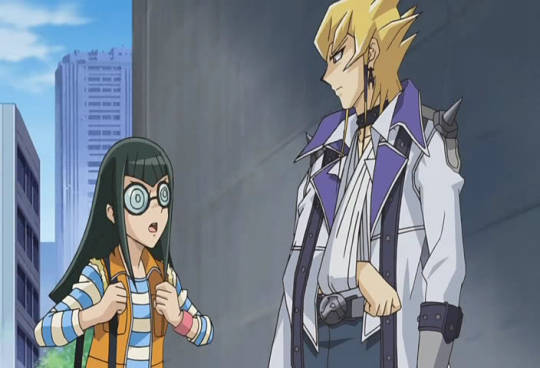
I shipped them big time. Even now, I still really adore their relationship. Most of my ships I end up becoming less obsessed with over time, but Jack/Carly continues even to this day to captivate my heart and imagination.
Recently, though, I’ve been thinking about the question, is their relationship good writing? Especially in how consistent it is with Jack’s characterization in the Fortune Cup arc, and whether or not it works to develop him as a character afterward.
(Of course, my personal stakes in the question is, should I be shipping them? While ships obviously don’t have to be well-written in canon or anything like that for someone to ship them, it’s significant to me because so much of the reason I liked Jack/Carly in the past is because it did feel decent character development, especially in contrast to what came after the Dark Signers arc.)
Why I’m Writing This
This sense of doubt about the writing of their relationship is especially spurred on by this character analysis of Jack:
“A lot of people seem to think that the introduction of Carly and the whole romancey subplot developed Jack as a character and for the better. I could not disagree more. If there's one word I'd associate with Jack prior to his entire development and dignity as a character going down the crapper, I'd have to say it's 'ego'. How did Rex/Jaeger get him to sell out his friends, steal Yusei's stuff and join him? He appealed to Jack's ego. How did he persuade him to stay after his first loss to Yusei? By telling him about the signer and reassuring him, again, that he was special. Overall, Jack just struck me as a very focused and driven character, intent on achieving his own goals on his own. He actively pushed away everyone who tried to get close to him, most obviously Mikage, who is consistently worrying over him but whom he never spares as much as a thought or a kind word for in return. Ever. This egocentric attitude is also, at the risk of over-analyzing, consistent with Red Dragon Archfiend, both in its moving away every defensive obstacle in its way and in its actively destroying any monsters that didn't join it in attacking. I generally don't like going onto this level of symbolism because it so easily devolves into semantic nonsense, but given the parallels here and the similarly fitting effects of Yusei's Stardust, I thought it worth mentioning. This would also lend a bit of further significance to him handing the card over to Yusei before the tournament, not only affirming his egocentric wish to beat Yusei at his strongest (and thus redeem himself for their last duel) but also his rejection of the self-sacrificing/others first mentality that the card represents. His obsession with Red Dragon Archfiend after that duel is also consistent with this interpretation, with Jack pushing himself even harder to prove to himself that his way is correct.
“Overall, I don't object to the notion of Jack learning to be less ego-centric as development, but the way the dark signer arc handled it was beyond contrived and ham-fisted, pushing him into an impromptu romance that was completely inconsistent with egocentric personality thus far and completely glossing over the far more interesting questions of how he'd rebuild his ego after essentially losing his entire self-image as the king in front of everyone. Instead, apparently all he needed was for a crazy lady to abduct him from hospital, blackmail him for the sake of her own career, then give a few lines of generic encouragement and invoke the power of love. From where I'm standing, it was obvious that he was intended to be Yusei's main foil, representing a pragmatic, egocentric worldview to contrast with his idealistic views on bonds and friendship, but equally clear that that idea was quickly scrapped in favor of shipping bait and deifying Yusei.
“Jack Atlus, he deserved a far better closure to his development than Stockholm syndrome.” --Aea (http://neoarkcradle.net/forum/showthread.php?tid=26&pid=735)
Before I get to what I think is actually pretty solid about this analysis, I want to address some points. The idea of Carly being “crazy” is pretty hyperbolic. Calling what she did “abduct[ion]” is just inaccurate--after all, Jack asks her to take him out of the hospital, and he also refuses to return when Mikage and Ushio go to get him. Of course, he tries to leave her place in episode 31, but he also seems to willingly return there at the end of the episode. Because she wasn’t really kidnapping him or holding him at her home against his will, their relationship isn’t Stockholm syndrome.
I do think there’s some validity to the idea of her blackmailing him for her career. She does try to draw attention to him when they’re out in public in episode 31 in order to get him to stick around so that she can get a scoop from him. As comically as it is presented in the episode, that’s nonetheless what she does (and she also tries to leverage his lack of gratitude, too!). But she does ultimately feels remorse for that and resolves to not write any article that would hurt a duelist (even despite the fact that Jack lets her write what she wants about him), which is glossed over in this analysis of Jack.
I also don’t think that the encouragement she gave Jack was super original. Here’s the exact quote (which she says in response to Jack divulging his past to her):
“If you get the picture that much, why don’t you just start your life over again? The old Jack died in that battle with Yusei. Now it’s time for the real Jack Atlas to live. Plus, it’d help you in becoming a real King, right?”
Essentially, she tells him that he can get back up again after his loss and be even better than he was before. Yeah, at face value, it is pretty generic. But I do think that it does speak into a lot of what he was struggling with, at least as it is depicted after his defeat. Now, whether these are things that make sense for him to struggle with is a different issue that I’ll discuss in a later section.
And finally, I do think that Jack/Carly invokes the power of love trope. At least, Jack invokes it himself when he is talking back to Godwin in episode 63: “No matter how much I deny it, I cannot escape from what’s known as ‘bonds.’ And what helped me understand that was one woman’s love!” I don’t think the power of love is necessarily a bad thing, and I think it makes sense for someone who gave up their bonds from the past to pursue his own goal to be able to be moved and changed by someone genuinely caring for them.
Now, whether or not it was a good decision to have love be the driving force in Jack’s character development during the Dark Signers arc is a different question, which brings me to the points of Aea’s analysis that I find really compelling and want to grapple with.
What I read Aea as primarily saying is that Jack in the Fortune Cup arc is depicted as a highly egocentric person, and that his plotline with Carly in the Dark Signers arc is a) inconsistent with that previous characterization and b) not as interesting as a plotline in which his egocentrism could continue to serve as foil to Yusei’s worldview.
I think a lot of that makes sense. I do think Jack was driven by his ego, and I do think that it might’ve been more interesting if his self-driven worldview were able to be given as much validity as Yusei’s idealistic, others-driven worldview, which is ultimately what is privileged. I can also see how Jack being primarily motivated by saving Carly during the latter half of the DS arc may be incongruous with his egocentrism just 20 or so episodes before.
At the same time, though, I think there are a lot of directions 5D’s could have gone which have the potential to be more interesting than the one it actually went, so rather than wondering about what could have been, it would be more worthwhile to examine Jack/Carly’s plotline and see whether or not it is inconsistent with Jack’s previous characterization, and also to see if it has any merit of its own as far as it develops Jack’s character.
Particularly, I am going to argue that a) although perhaps not as well executed as it could be, it made sense for Jack’s character to need to change after the Fortune Cup arc, and the way it changes is not incongruous with his previous characterization. Indeed, Jack’s character development in the Dark Signers arc centers around him reconceptualizing what being a King is.
Also, b) Jack and Carly’s relationship ultimately deals with and says interesting things about the idea of being driven by oneself that, rather than totally undermining the mentality that initially drove Jack to abandon his friends to become King, gives it some nuance.
Point A: It made sense for Jack’s character to need to change after the Fortune Cup arc, and the way it changes is not incongruous with his previous characterization. Indeed, Jack’s character development in the Dark Signers arc centers around him reconceptualizing what being a King is.
So throughout the course of one arc, Jack goes from being a man who is motivated primarily by himself and his desires (to the point of being willing to put down others for them), to a man whose main reason for action is someone else’s well being. It does seem like a stark change. Rewatching the Jack/Carly duel, the sheer amount of concern for Carly that Jack shows is pretty astounding.
But I think that it’s understandable for there to need to be a change. For one, the particular reason why Jack lost to Yusei in episode 26 in the first place is because he tried to win using the same strategy as before--he wanted to redeem himself for his first near loss. Clearly there is a need for a change: Jack loses not once but twice to Yusei in the same season, and Yusei also cites Jack’s pride as a King as his reason for his loss.
The drama between Yusei and Jack during the Fortune Cup arc is driven by Jack losing to Yusei and needing to duel and beat him again to redeem himself and prove he’s the better duelist--that he truly deserves the title of King. In episode 6, when Jack realizes he would have lost to Yusei, it’s clear that he’s not driven by how his fans perceive him. While his fans have no idea that he lost, he’s nonetheless still bothered because he, the King, knows. In episode 8, Jack feels like he’s not the King anymore, even though Mikage says he still seems like one. The cheers of his fans sound hollow because he knows he doesn’t deserve them.
Something I find interesting is Jack’s awareness of his counterfeit Kingship revealed through his calling himself a clown. After his initial defeat, Jack asks Mikage if he’s a clown in episode 8, in episode 25 he asks Godwin to release Rally and co as “reward for a clown,” and in episode 31, he also uses the language of a clown when he talks to Carly: “Back then, I gave up everything, and what I gained from it was the path to being a King who continually acts like a clown as he lies about his true identity.”
Because of this, the way I see Jack’s character is that his identity as the King was made counterfeit at almost the very beginning of the series (episode 5). He then spends the entire rest of the Fortune Cup arc trying to regain his original conception of his King identity, only to ultimately fail. From Jack’s own language, I think we’re meant to see this as Jack’s foolishness. While it may have seemed fine for two years, the King identity that he had held onto no longer worked for him. When confronted by someone from his past, his King identity starts to crumble--first he’s defeated not once but twice, then it’s revealed he’s actually from Satellite, etc. In episode 25, he even shows awareness that Godwin baited him with the idea of being a duel king; when Godwin asks if that isn’t what he wanted, Jack says that he wanted to rule as “the King [he] truly desired to be.” Indeed, it’s revealed that he wasn’t even valued by Godwin for himself, but rather as a means of getting to Yusei. It makes sense, then, that his development after his defeat should center around letting go of his original conception of his King identity and discovering something more true.
All of these realizations are those that Jack comes to more or less on his own; Carly even says that Jack already “get[s] the picture.” So I do think it is congruous with Jack’s Fortune Cup characterization for him to need to find a new way of being King in the Dark Signers arc. Hence the need to start over, as Carly suggests. (And which is revisited in episode 37 when Jack talks to Mikage again, episode 59 when Carly does her fortune telling stuff, etc.)
I think it’s because Carly gives him hope after he loses his King identity that she makes such a mark on him and effectively becomes his main motivation in the DS arc. And I mean, Jack in the DS arc is still pretty aloof and pushes others away—he makes it clear to Yusei that he “hasn’t become anyone’s friend” in episode 45, and he really doesn’t rely on anyone else even as he angsts over Carly. No one even knows the identity of the Dark Signer he’s fighting. While Yusei still draws on his friends for strength, we see Jack continue his independent streak. Heck, he even pushes Carly away! (And she honestly probably would have been better off and not have gotten killed if she had just stuck with him, but that’s for another AU...)
An aside - I sometimes read people saying that they think Mikage could have filled the same role Carly did. Maybe, if written differently, she could have. But I think it’s notable that when Jack is angsting about having lost his sense of being a King in episode 8, Mikage is not really able to understand or speak to him in a way that actually meets him where he is. She clearly cares about him, but I think she’s not able to get past the image of the King that she and his fans project on him. I think Carly is able to empathize with his pain more. When Jack calls himself foolish and a clown, Carly doesn’t try to convince him he’s wrong--instead, she says something more like, “Sure, that’s true--but that doesn’t have to still be who you are.”
Point B: Jack and Carly’s relationship ultimately deals with and says interesting things about the idea of being driven by oneself that, rather than totally undermining the mentality that initially drove Jack to abandon his friends to become King, gives it some nuance.
I would argue that this is because Carly’s own character, as well as their relationship in general, deals a lot with themes of selfishness. While not presented as starkly as Jack’s self-drive is, it is obvious that Carly is someone who is self-driven and desires to achieve her goals, not completely unlike Jack. Her first appearance has her going past a swath of reporters to talk to Godwin, and her subsequent interaction with her boss shows that her job is precarious and that the scoops she seeks after are at least in part to keep her job. Like Jack, she came from a lower class background (although “the streets” rather than Satellite), and she doesn’t seem to have any close ties (Angela the reporter might count, but that’s a stretch). And when she goes to talk with Yusei and Dick Pitt after their duel, her concern is not with their wellbeing but about getting information from them for a scoop. “Straight ahead is the only way for me,” is something she repeats, showing that she knows where she wants to go and is determined to get there.
Indeed, Carly would not have met Jack at all if she had not snuck into the hospital trying to learn if he was truly from Satellite. She is someone who is driven primarily by herself, albeit more innocuously than Jack is. This also underlies why she was willing to “blackmail” Jack into going to the amusement park with her. She needs a scoop and is ready to do what it takes to get it.
But, we see how in the same episode, she starts thinking less of herself and more about another--Jack. She thinks, “He’s really hurting inside. And here am I trying to write an article about it. Am I a bad person for that?” She considers what he is going through, rather than just her own needs. When she defends Jack to Angela, she is driven not by her desire to keep Angela from getting her scoop, but a genuine care for Jack. And when she figures out he’s going to the tower to look at Satellite, it’s only by inhabiting his point of view and thinking about what he may want. Yet the question she asks herself--whether or not it’s bad to be writing a scoop about him (after all, it is her job, as Angela points out)--is an important one for her.
As self-driven as Carly is, she realizes she has limits--that is, she would not go as far as to hurt another person to achieve her own goals. Jack, on the other hand, has already done that, putting Rally in peril and taking Yusei’s card in order to get to Neo Domino City and become King.
We see again how Carly can be self-driven when she tries to get closer to Jack after he leaves, and when it is ultimately an illusion of happiness with Jack that causes her to fall back into her Dark Signer persona. Yet even then, it is clear that she does not want to hurt anyone, and Jack repeatedly reiterates this.
This culminates in the conversation she has with Jack before she dies: Carly: I loved cheering people on who tried their hardest like you, Jack. Despite that, because I tried to wish for such selfish happiness, I must’ve been wrong for doing so, huh? Jack: That’s nonsense! Everyone has the right to wish for happiness. If you’re saying that’s a crime, then I’m just as guilty!
Carly says herself that she was motivated by her own desires. Jack, in affirming her desire to obtain happiness, also affirms the ambition that drove him to abandon his friends. However, we see in how Carly is reluctant to hurt others that while it is not bad to want to pursue one’s goals and happiness, it is important to consider the impact on other people. It wasn’t bad for Carly to want to be with Jack, but it would obviously be bad for that to necessitate the deaths of many; it’s not bad for her to want to write a successful story, but it’s bad for her to take advantage of duelists’ like Jack’s pain to tell that story. This allows us to view the Jack in the FC arc in a new light: his desire to escape Satellite and become a King wasn’t bad, but it wasn’t right of him to harm others in order to get there.
Ultimately, Jack and Carly’s relationship is about two people learning how to pursue their happiness and also learning to put each other’s happiness first.
#jack atlas#carly nagisa#scoopshipping#meta#yugioh 5d's#i have way too many thoughts about this card game anime#retributionshipping#carly carmine#yugioh#otp: you can't even ride the monorail
58 notes
·
View notes
Text
So, apparently there's this theory that Arya's chapters in ADWD are either a year behind or a year ahead of the other POVs? And it’s stupid af extremely baseless.
You know why it exists? Because when Tycho Nestoris is talking to Jon, he says there was ice in the canals of Braavos when he left, and Arya's chapters (including TWOW’s “Mercy”) never mention that.
But I’m sorry, that’s a ridiculous nothing to try and base a timeline on. I live in Chicago, and if someone called me up in January to say “there was snow on the ground when I was in the city last week”, I’d very likely tell them, “we’ve had some warm days, it’s all melted now.” (Mind you, a week later I’d be saying, “damn, 12 inches, digging out my car's going to be a bitch, lol.”) Like, weather changes. That's sort of the definition of weather (vs climate) -- it's not constant, it varies from day to day, even during a season.
To actually figure the timeline in Arya's chapters relative to other characters, you need to look at the news from Westeros that reaches her. Like the slave ship full of wildlings that ended up in Braavos because of a storm, is full of the people from Hardhome that we hear about being kidnapped by slavers in Jon's chapters. And the storm that drove the slavers to Braavos, is probably the same one that dumped Davos on the Three Sisters. Furthermore, in the epilogue of ADWD, Kevan tells Harys Swyft to go to Braavos on a mission for the crown, and to hire Gregor's men as his guards if he’s worried about assassins... and in “Mercy”, Harys Swyft is in Braavos with Raff the Sweetling as one of his guards. As the Small Council wanted Harys to leave right away, we know that “Mercy” must take place within a few weeks of the end of ADWD.
As for the canal ice thing, well, it just means there was a lucky couple of warmer days around the time “Mercy” takes place, or that Tycho happened to leave during a cold snap that didn’t last long, or... it's just a minor error that may or may not be fixed before publication. GRRM has a lot of minor errors like that; for example, theory-wise, the “narrow hips” vs “wide hips” thing for Jeyne Westerling, which only got fixed in the latest editions of AFFC a little while ago. Something like that is not meant to be important or relevant, odds are it’s just something GRRM overlooked and really doesn’t care about.
But the problem with these sorts of theorists is that they focus on a tiny incongruity and poke at it for “proof”, building a giant framework around it, while overlooking all the actual text and character work that could topple their tower in a second. Also, in my experience, they don't read -- or read very selectively, laser-focused on one or two characters and ignoring the others -- or only look at quotes other people have put together. But I think the main issue is they're not reading the books as a whole, or ignoring or skimming their non-faves, and therefore miss far too much.
This is why I got called a prophet for predicting Arya was going to encounter Raff in Braavos and probably kill him. It wasn't prophecy, only logic and putting the pieces together. And I didn’t do it by reading only Arya's chapters, I figured it out by reading Arya’s and Jaime's and Brienne's and JonCon's and Kevan's chapters. Despite the POV format, GRRM thinks of the books as a gestalt and writes accordingly, and really, that’s how we should be reading.
#asoiaf#asoiaf meta#asoiaf theories#arya stark#valyrianscrolls#asoiaf timeline#a dance with dragons#the winds of winter#braavos#harys swyft#raff the sweetling#mercy#jeyne westerling#grrm#sometimes can be a master planner but sometimes a mistake is just a mistake#btw gestalt doesn't mean 'obsessively read every POV believing each line is secretly about your fave' which i've also seen sigh
127 notes
·
View notes
Text
M*A*S*H: Genre and Themes
Considering the fact that M*A*S*H is a show set during the Korean War, about a mobile army surgical hospital a few miles from the front line, it seems impossible that it could be anything but a war show, albeit a dramedy centered on Armed Farces, much like the shows Hogan’s Heroes or McHale’s Navy.
And indeed, as it turns out, M*A*S*H is a war dramedy. No more, no less. This isn’t one of those times where I try to convince you otherwise.
But that doesn’t mean it’s not worth a look anyway.
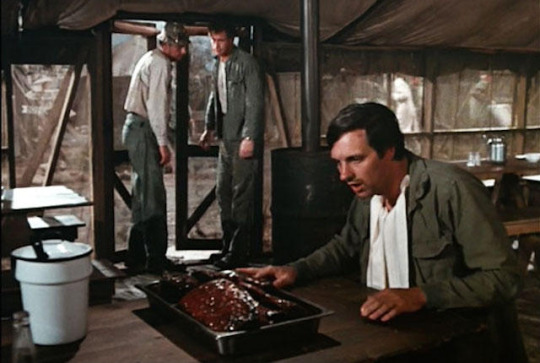
In many previous ‘genre’ articles, I’ve mentioned the basic fact that there are very few pieces of media, whether movies, shows, or books, that can be placed in only one category of genre. As I’ve pointed out, even the most apparently one-dimensional works of art contain aspects common to other genres, which makes sense. No show is created to fit in one single category, and the best examples fit into several. Although most shows are able to be categorized into one main genre, the fact is, a film or show tends to naturally carry more characteristics of one specific genre than others.
In the case of M*A*S*H, though, the melding point between the genres can be a little tricky to spot. In a show like this, picking out the ‘dominant’ genre is harder than one might think. It’s a sitcom that refused to stick to format (or a laugh track), a war show that lasted three times longer than the war it was about, and a drama that was more than capable of laughing through the tears and heartache inherent to the tragedy of the situation around them.
In other words, each individual genre of M*A*S*H ‘mashes’ together, to the point where they’re inseparable from one another.
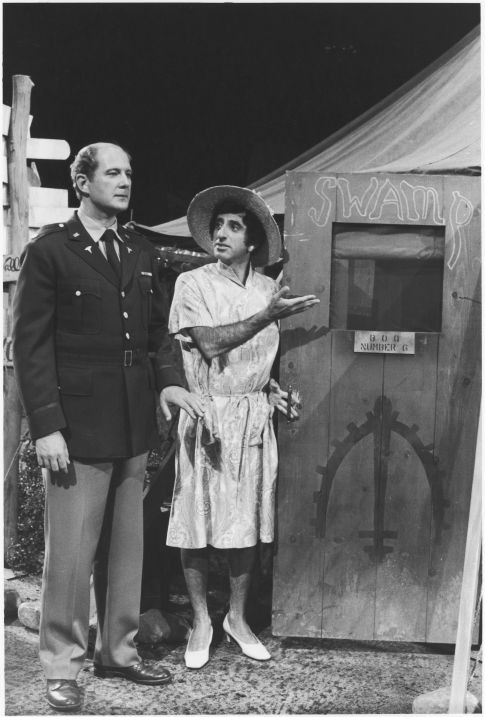
So, naturally, we’re going to see how that works. Today, we’re going to be analyzing M*A*S*H in order to dissect its use of genre, be it comedy, war, or drama, and how these all fit together to create the most iconic war sitcom of all time.
Let’s take a look, starting with the opening credits.
The opening credits of a show can say a lot about it. The theme of a television show is there for a reason, and not just so that people have time to get their snacks and sit down before the story starts, and it’s not just to list the cast and crew. No, the opening credits for any show set the stage for the show, the ‘setup’, giving the audience members a taste of what’s to come. The music choice and the decision in what clips are used is instrumental in setting up the audience’s expectations, as done in sitcoms like Growing Pains, with shots of the main family over upbeat music, or Star Trek, with an instrumental exciting theme over the Enterprise soaring through space.
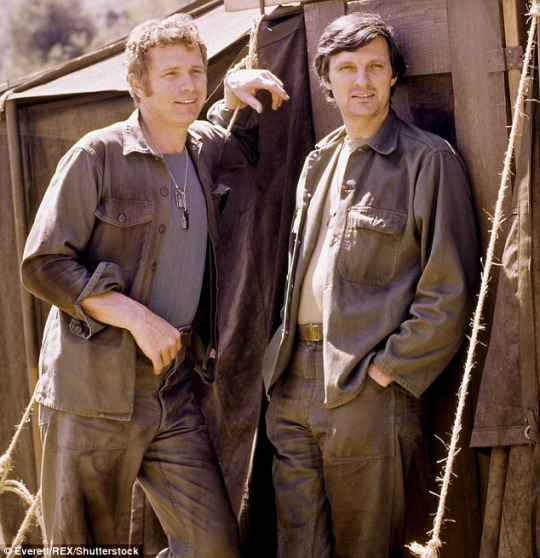
With that said, how does M*A*S*H open?
Well…not in a particularly funny way, I’ll say that much.
The music used for the opening credits for M*A*S*H is an instrumental variation of the theme used for the film: titled ‘Suicide is Painless’. While losing an edge of ‘grimness’ thanks to the lack of lyrics, the visuals accompanying it are anything but uplifting.
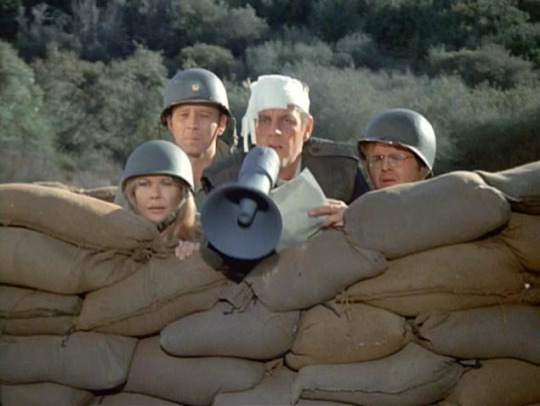
The sequence shown over the opening of each M*A*S*H episode is the same: helicopters arriving from the front with wounded. Hawkeye Pierce and (depending on the season) either Trapper McIntyre or B.J. Hunnicut approach the choppers, examining the patients, and delivering orders, taking them back down to the camp.
It’s not funny, it’s not uplifting…it’s war.
And that’s the point.
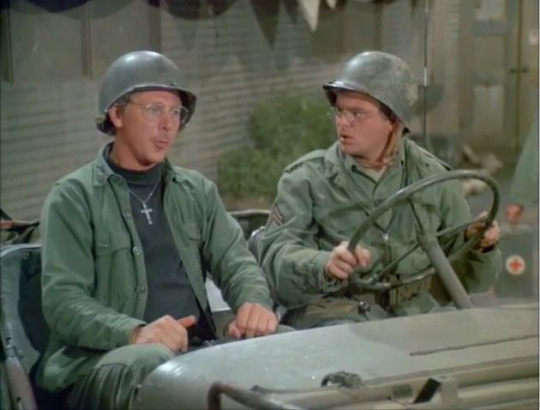
Each M*A*S*H episode opening is the demonstration of the central tone of the entire series: no matter what hijinks are going on in this episode, be they Radar learning to DJ or Klinger going for the pole-sitting record, in the end, they are in a war, and people are getting hurt, and killed, and that’s why these people are here: to stop it as best they can. The opening of each episode is the reminder of that: that these men are doctors, and for all of their insanity, in the end, they care about the patients. No jokes, no smiles, just business.
So, how does that reflect the show it belongs to?
To be honest, the opening can seem a bit incongruous with the show itself, at times. Especially in the early years.
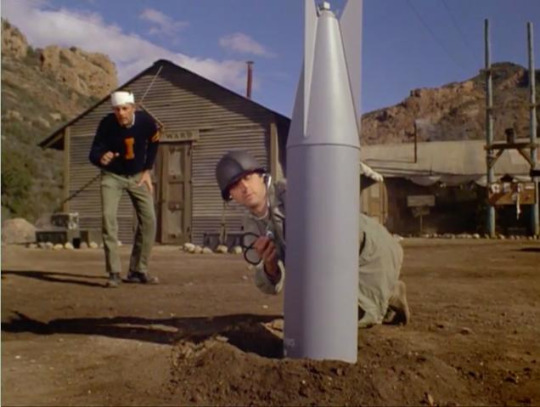
M*A*S*H is often remembered as a war sitcom, which, in all fairness, it was. It was funny. Episodes like “Adam’s Ribs”, “Yankee Doodle Doctor”, and “Captain Tuttle” are just a few in a large selection of episodes focused around making the audience (and characters) laugh. Watching B.J. and Hawkeye play a game with no rules is really entertaining, and so is watching Henry Blake’s desk get flown off in a trade for medical supplies. But what’s important to remember is, M*A*S*H was no Hogan’s Heroes.
At the end of the day, the situation, as funny as it might have been, was not ‘okay’. There was no sense of overall ‘security’ like there was in other war sitcoms: in M*A*S*H, the war took center stage.
The best example of M*A*S*H’s use of genre may be in the early episode, “Yankee Doodle Doctor”. The episode itself is pretty simple: A documentary is being made about the 4077th, which, as the staff soon discovers, is essentially war propaganda. Hawkeye and Trapper destroy the footage in existence, in order to create their own ‘film’. The movie they make is a Marx Brothers pastiche, intentionally over-the-top humorous…until the end of the episode.
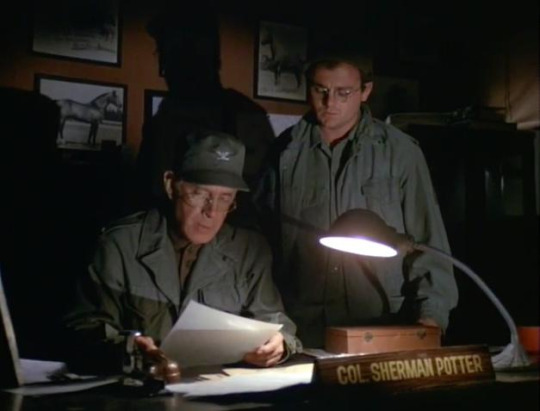
The final shot of the 4077th’s film is not a closing joke from the Groucho-esque Hawkeye Pierce. Rather, it is a monologue, delivered by Hawkeye from Post-Op:
“Three hours ago, this man was in a battle. Two hours ago, we operated on him. He’s got a 50-50 chance. We win some, we lose some. That’s what it’s all about. No promises. No guaranteed survival. No saints in surgical garb. Our willingness, our experience, our technique are not enough. Guns, and bombs, and anti-personnel mines have more power to take life than we have to preserve it. Not a very happy ending for a movie. But then, no war is a movie.”
He’s right. This isn’t a happy ending, and it’s not a funny one, either. And that is what M*A*S*H is all about.
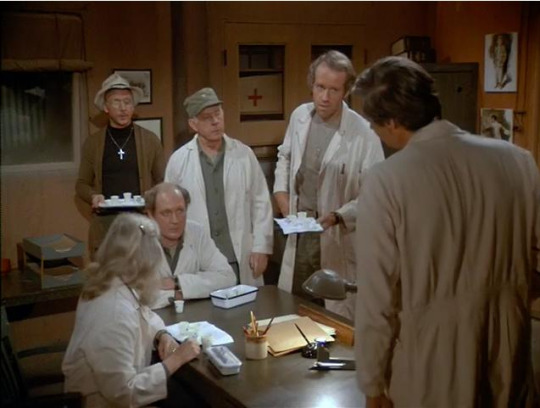
M*A*S*H was a sitcom in that it was full of characters being funny, often accompanied by the laugh-track that was part of the package of a comedy show of the time. On the other hand, the show was also a war show, constantly tackling ideas like coping with death.
Both of these are huge parts of its identity as a show, but in the end, that’s not what M*A*S*H was really about. It was about the people.
M*A*S*H may have started out as a show about a bunch of off-the-wall doctors engaging in wacky hijinks and antics, but it ended as a family struggling together to hold onto sanity in the middle of a war. As with most television shows, the characters and individual plots for M*A*S*H are directly influencing the genre it’s placed in, and as a result, it’s a little hard to pin down.
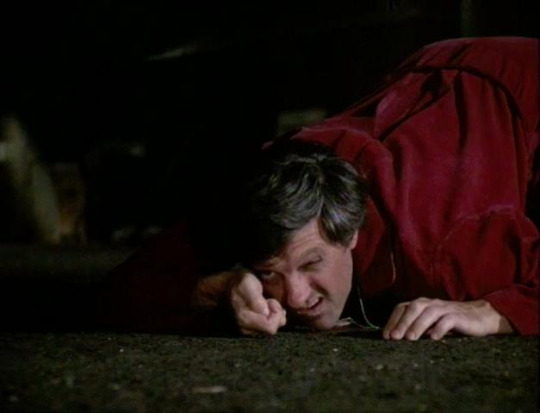
Like I said, the show is centered around the personnel in a M*A*S*H unit, and their struggle to maintain control of their lives in an uncontrollable situation. And while these episodes aren’t always realistic, or even remotely plausible, the characters feel realistic and plausible, flexible enough to fit into multiple genres and scenarios without changing.
There are funny episodes, and tragic episodes, but honestly, most were bittersweet. Life, and war, are messy, and episodes like “Good-Bye, Radar”, “The Interview”, “Old Soldiers”, or even “Goodbye, Farewell, and Amen” were reminders of that. M*A*S*H couldn’t shy away from what it was, to do so would be dishonest.
To quote Hawkeye himself:
“If jokes seem sacrilegious in an operating room, I promise you they’re a necessary defense against what we get down here at this end of the draft board.”
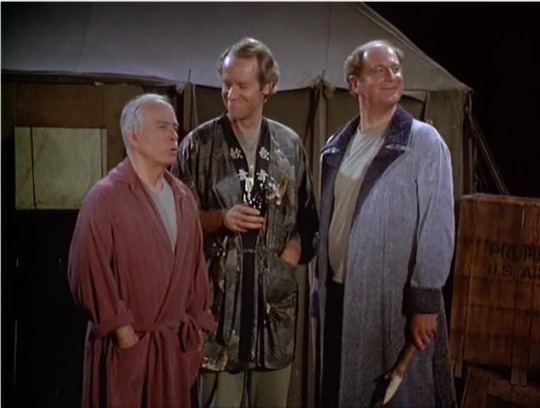
In the end, that’s what the show was all about.
Characters were exaggerated, sure. Scenarios were somewhat removed from reality. But at the end of the day, M*A*S*H understood that life, and war, don’t have a genre. There is drama, and there is comedy, and the two are intermixed, underscored by the occasional laugh-track, used sparingly as the show went on.
It’s important to note that the drama in the show wasn’t always big drama. It wasn’t always steady streams of patients into the O.R., or Hawkeye’s mental breakdowns. Sometimes it was Radar’s mom trying dating again, or Margaret getting married. And just the same, the comedy on the show wasn’t always big-laugh moments like the Mulcahy sound-alike contest. Typically, the comedy in M*A*S*H was rooted in something else: interactions between characters.
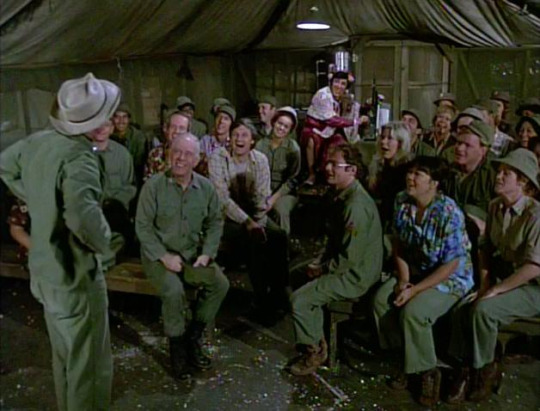
The humor in M*A*S*H was less reliant on ‘wacky hijinks’ and more grounded in Radar’s sneaky side-insults, Frank Burns putting his foot in his mouth, B.J. and Hawkeye laughing at one another’s jokes, or Mulcahy’s willful ignorance of some of the camp’s activities. The audience laughs with these characters, rather than at them. The characters feel like developed people, with lives and goals, and as a result, the humor and the drama work well together, rather than feeling juxtaposed.
In other words, M*A*S*H was a war show, full of good dramatic stories, with funny, memorable characters.
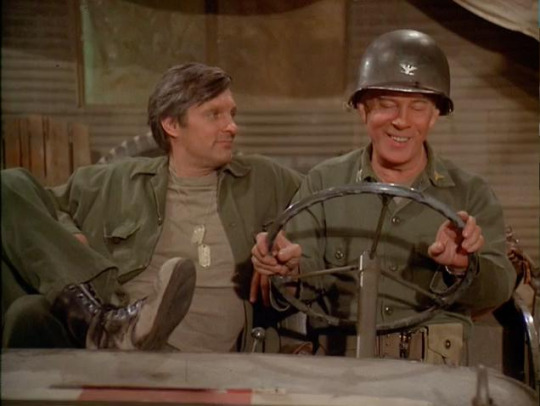
Thirty years after the most-watched television finale in America, that’s what people remember about M*A*S*H. We may forget the specifics of “The Longjohn Flap”, but the audience remembers what happens to these people, and the experiences they had. Those characters, and the situation, still holds up, and even today, viewers can still relate to those characters and their experiences. The laughs, the tears, and all the spots in-between, still speak to an audience, nearly a hundred years after the war the show was about.
Join us next time as we take a look at the personnel of the 4077th, and figure out what made them one of the most memorable casts in television history. Thanks so much for reading, and I hope to see you in the next article.
#M*A*S*H#70s#Television#TV#TV-PG#Comedy#Drama#War#Alan Alda#Loretta Swit#Jamie Farr#William Christopher#Wayne Rogers#McLean Stevenson#Larry Linville#Gary Burghoff#Mike Farrell#Harry Morgan#David Ogden Stiers#Larry Gelbart
6 notes
·
View notes
Text
Problematic Atlas Quotes: Volumes 1-3
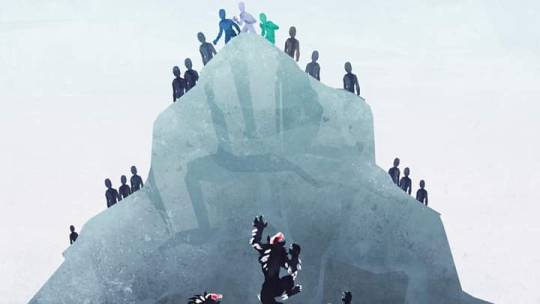
All of the places on Remnant put together have not produced as many jarring incongruities and mixed messages as Atlas. These are all quotes relating to Atlas that really stood out to me at the time and have stayed with me since.
Volume 1
Penny: I am combat ready! (Yeah, but are you ready for anything else? And who would send out a cute girl robot who was ONLY ready for combat?)
Weiss: The innocent never run, Yang! (Karmic law says that one will come back to bite your ass, Weiss.)
Penny: I don't have a lot of friends, but if I did, I would want them to talk to me about things. (We haven't seen this one come back around to Penny yet. Blake, yes. Penny, no.)
Volume 2
Ironwood: But ask yourself this: Do you honestly believe your children can win a war?
Ozpin: I hope they never have to. (Note that Ozpin believes they can. It's having to fight he considers a failure. Later revelations would make his view even more tragic.)
Ruby: But why not let us know you were okay?
Penny: I... was asked not to talk to you. Or Weiss. Or Blake. Or Yang. Anybody, really.
Ruby: Was your dad that upset?
Penny: No, it wasn't my father... (Ironwood speaks next. An early sign of Ironwood's controlling nature.)
Penny: I'm the world's first synthetic person capable of generating an Aura. (Tell me more.)
Penny: One day, it will be my job to save the world (The whole world? Seriously, tell me more.)
Penny: It's okay, Ruby. They're not bad people; I just don't want to get you in trouble. (And why would talking to you get Ruby in trouble? And why send her to a festival that encourages students to talk to each other if you won't let her talk?)
Penny: Just promise me you won't tell anyone else my secret. Okay?
Ruby: I promise.(If she HAD told Pyrrha, the whole debacle might not have happened. Will this come up again?)
Roman: As some of you may have heard, this right here... (Taps the giant mech) ...is Atlas's newest defense against all the scary things in the world. And thanks to my "employer", we've managed to snag a few before they, uh, "hit the shelves". (Damn, Atlas, y'all got a lot worse security problems than Ruby.)
(The image of Penny dancing by herself at the ball surrounded by uniformed guards. Say what?)
Ironwood: Ruby, I feel it's appropriate to let you know that I think what you did last night is exactly what being a Huntress is all about. You recognized a threat. You took action. And you did the very best you could. (Ah well, that's nice. Doesn't entirely fit in with the rest of your character James, but it's nice.)
Ruby: Wait. You think this girl is connected to Torchwick and the White Fang?
Ozpin: It's possible. But we still lack the required evidence to link the two together.
Ruby: Actually, I... I think I remember her saying something about a hideout, or something, in the southeast. Just outside the Kingdom.
Ozpin: Interesting.
Glynda: I thought you said the intruder never—
Ozpin: Thank you for your cooperation, Ruby. Why don't you go and spend some time with your team? You have a big day ahead of you.
Ruby: Any time.
Ozpin: And Miss Rose, please try and be ... discreet about this matter.
Ruby: Yes sir. (This tells Ironwood several things. It tells him that Ruby will lie for Ozpin, that Ozpin will cover up Ruby's lie to protect her, and most importantly that Ruby and Ozpin TRUST EACH OTHER.)
Glynda: Why must your answer to everything involve a triumphant display of military bravado!? You treat every situation like it's a contest of measuring di—!
Ozpin: Glynda!
Glynda: Well, he does. (Tell me more, Glynda.)
Ozpin: You're a general, James. So tell me, when you prepare to go to war, which do you send in first? The flag bearers, or the scouts? (Why is a civilian Headmaster schooling a general with a lesson taught to greenhorn Lieutenants? And why does he have to?)
Ozpin: We fought for countless reasons, one of which being the destruction of all forms of art and self-expression. (SOME kingdom has control issues.)
Glynda: You're a good person, James. You've always done what you think is best for the people, even against strong protest. It's admirable. But it's high time you stopped talking about trust and started showing it. (So Ironwood's trust issues are not new. Tell me more.)
Councilman 1: You've left us no choice! The Vytal Festival tournament cannot be broadcast, let alone held, if we are unable to ensure the safety of the citizens.
Councilman 1: Ahem... Therefore, we have reached out to the Atlas Council and together have decided that the best action is to appoint General Ironwood as head of security for the event.
Ironwood: Thank you, Councilman. Our Kingdom is happy to lend as many troops as it takes to ensure that the event runs smoothly and safely as possible.
Councilman 1: And we thank you, General.
Ozpin: Will that be all?
Councilman 1: For now. But after this festival comes to a close, we are going to have a serious discussion about your position at Beacon Academy. General Ironwood's reports over the last few weeks have left us somewhat... concerned. I am sure you understand.
Ironwood: This is the right move, Ozpin. I promise, I will keep our people safe, you have to trust me.(Damn dude, what did Glynda just say about trusting people? And why do you expect Ozpin to trust you when you clearly have tattled behind his back?)
Ironwood: You brought this on yourself. (Yeah, he did. By trusting you.)
Volume 3
I have already written a detailed post on the vast discrepancies between how Winter Schnee behaves and what she is trying to convey in her first scenes, titled "Snowbirds of a Feather". Suffice to say Ironwood isn't the only Atlesian sending mixed messages.
Ironwood: If you were one of my men, I would have you shot!
Qrow: If I was one of your men, I'd shoot myself.(So y'all have an acrimonious history as well. Okay.)
Goodwitch: While I wouldn't condone his behavior, retaliating like you did certainly didn't help the situation. ("Call yourself a grown-up? I've seen better behavior from first-year students! Why do I even have to say anything to you? Don't answer that.")
Qrow: You sent me to get intel on our enemy, and I'm telling you, our enemy is here.
Ironwood: We know.
Qrow: Oh! Oh, you know! Well, thank goodness I'm out there risking my life to keep you all informed!
Ironwood:Qrow-
Qrow: Communication's a two-way street, pal. You see this? That's the SEND button.
Winter: They had reason to assume you'd been compromised. (So, Ironwood, explain to me WHY, if you seriously think Qrow has been compromised, you haven't brought it up with HIS BOSS before now? Isn't that information kind of important?)
Qrow: Despite what the world thinks, we're not just teachers, or generals, or headmasters. The people in this room, the leaders of the other two academies, we're the ones that keep the world safe from the evils no one even knows about! It's why we meet behind closed doors, why we work in the shadows. So you tell me, James, when you brought your army to Vale, did you think you were being discreet, or did you just not give a damn!?
Ironwood: Discreet wasn't working. (Explain.)
I'm here because this is what was necessary. (Explain.)
Qrow: You're here because Ozpin wanted you here! (Is it just me, or does anyone else think this sounds like it was an unpopular decision?)
Ciel: Ruby Rose. 15. Hails from Patch. Leader of Team RWBY. Status: Questionable. (Daaaammmn son. We need to talk. You ordered a full background check on a teenage girl just because she talked to your android? And then you gave it to your android's handler? And on top of all that, a gifted honor student from a multigenerational Huntsmen family who leads Beacon's first-year star team, who Ozpin clearly trusts, only rates as "Questionable"? Who doesn't rate as "Questionable"? Oh that's right. Qrow is also "Questionable", and so is Ozpin. Tell me, do you rate yourself as "Questionable"?)
Ciel: Penny? I believe it is best if we move on to our next location.
Penny: Could we have just a minute to talk? (No seriously, is Penny now not allowed any free time?)
Ciel: It's been precisely one minute, ma'am.(Apparently not.)
Penny: Ruby, there's something I've been wanting to talk to you about. I want to stay at Beacon.
Ruby: Penny, they'll never let you do that.
Penny: I know, but I have a plan.(Tell me more.)
Yang: You're from Atlas. What could we expect?
Weiss: Well, seeing as their Kingdom, academy and armed forces are all merged as one, I think we can expect strict, militant fighters with advanced technology and carefully rehearsed strategies. ... Or whatever they are.(So even other Atlesians think Atlesians send mixed messages.)
Ironwood: For the past few years, Atlas has been studying Aura from a more scientific standpoint; how it works, what's it made of, how it can be used. We've made... significant strides. And we believe we've found a way to capture it.
Qrow: Capture it and cram it into something else. (Dude, exactly WHERE did Penny's Aura come from?)
Ironwood: What I believe and hope this to be is nothing more than the result of stress and adrenaline. When you're out on the battlefield, your judgment can become clouded in an instant. Sometimes you see things that simply aren't there. Even after the fight is past... (That answers that question. You don't trust yourself either. What happened to you?)
Ironwood: Ozpin, the girl... I-I can explain! (You've got a full scale Grimm invasion going on and you're more terrified of OZPIN? What did you do to create Penny, James? How ELSE have you betrayed Oz?)
Ironwood: Qrow! This isn't my doing! (Why did you automatically assume Qrow is attacking you instead of looking behind you? Guilt?)
This post is long enough already, so I'll finish later. While I may be overreacting to some of these statements, that doesn't explain all of them. It's looked from the beginning like there was something fishy going on in Atlas, especially having to do with Ironwood.
#rwby#penny polendina#rwby ruby rose#james ironwood#weiss schnee#yang xiao long#ozpin#glynda goodwitch#ciel soleil
84 notes
·
View notes
Text
HÄNSCHEN’S PROMISCUITY (OR LACK THEREOF?)
it’s a commonly accepted feature of hänschen’s character that he is sexually voracious, highly desirable, and all around getting lots of action. before trying to understand if this is an accurate description of hänschen, it may be helpful to try to first understand how it has become so ubiquitous. this impression seems to be founded on a few key staging aspects & choices, mainly relying on the musical:
“the bitch of living” — our introduction to him, where he claims to have a successful strategy to sexual advances: “it’s like just kiss some ass, man / then you can screw ‘em all.” this implies that his tactic of ‘play nicely, adhere to rules, and butter people up’ gets him what he wants. and what does he want here? sex. so the message would seem to be that he is sexually accomplished.
“word of your body reprise” — this scene typically plays up hänschen as suave and undaunted by sex, implying experience
open flirting — unlike most of the other boys, hänschen explicitly flirts with the object of his desire. see the “do a little achilles and patroclus” exchange, which references, of course, the well documented homoerotic relationship of two characters in homer’s ‘iliad’
the proto-rake characterization — hänschen’s written to epitomize a teenage version of the rake archetype, dashing, scandalous, and sexually predatory.
sexualizing his character by writer and audience — the audience is granted the most explicit sexual moment of the show through hänschen (his masturbation scene), and so from the audience’s perspective, hänschen is the most explicitly sexualized from the cues given by the text of the show, and easier to project sexuality onto (compare the representation to moritz, who thinks just as much about sex, or melchior, who we also see self-pleasuring but through veil of metaphorical music).
given these factors, it seems reasonable that many people consider hänschen a promiscuous character, and even when people defend hänschen as not so promiscuous (not to make a moral judgement that he must be defended from that insinuation) they tend to resort to a claim of “musical hänschen might be like that, but play hänschen isn’t.” the evidence usually pointed to in order to prove non-promiscuity would be:
his genuine & prolonged interest in ernst — the play suggests that hänschen cares about ernst in more than a sexual way, asking more after his grades and hoping to see him beat out moritz to reach the next school year.
the sincerity of the vinyard scene — the vineyard scene is a direct parallel to wendla and melchior’s relationship, contrasting wendla’s earlier rape with a soft and amorous interaction between hänschen and ernst. this scene is not presented as predatory (whereas the musical makes this explicitly predatory on hänschen’s part).
difference in the ‘desdemona’ staging — hänschen is markedly seeking to prevent masturbation by destroying his picture, and lamenting that he’ll likely relapse. he does not seem to enjoy the idea of pleasuring himself, making the image of him as a hedonist or a rake deeply flawed at best and impossible at worst.
i think that the dichotomy between these portrayals is somewhat arbitrary, though, and would argue that nothing in either text can make a truly compelling case for hänschen’s promiscuity. the texts indicate this to me in the following features:
(in the musical) reputation among the girls — wendla, anna, thea, and martha all seem to find hänschen unpleasant and undesirable, teasing one another that the last one to the bridge “has to hold hands with hänschen”
the text of the ‘desdemona’ monologue — regardless of the fact that the musical lets hänschen enjoy this scene a little more, the text in both cases is still directly stating his intent to get rid of his temptation and to stop masturbating.
(in the musical) his participation in “the bitch of living” — being in this number at all necessarily relegates him to the same chastity as his classmates. the song’s major theme of ‘not getting any’ makes no sense if one of its complainers is, in fact, ‘getting some.’
the vineyard scene still exists — quite frankly, they would have to entirely remove the vineyard scene to remove the mutual attraction and gentility that is its foundation. the musical did its darndest to make hänschen seem the predator, but from my own experience, and the experiences of those i’ve spoken to, it tends to be seen as predatory as a presumption of gay men being predatory, and gay persons, without that prejudice, read the coding much more kindly.
“the real fuel of the masturbator’s shame is solitude” — it’s a quote from jonathan franzen’s translator’s note, and though lord knows i have bones to pick with franzen about some of his hotter takes, he articulates hänschen’s struggle rather effectively here. to summarize, what makes hänschen’s character is an innate loneliness which drives him to imaginary comforts. he is alone, and ashamed of his desire, but also ashamed of being alone. he creates the fantasy of his ‘brides’ to reject the uncomfortable reality that he is intimate with no one. to present him as so invested in the fantasy of his pornography as to feel that he needs it and at the same time claim he is capable of real intimacy with other people (that is: having sex) is contradictory at its very core. because hänschen’s plot line in the musical still relies firmly upon his identification as a masturbator, this truth still holds in both cases.
to sum all the above up, fans tend to perceive a split between hänschen’s depictions, claiming the musical makes him promiscuous while the play does not. i would argue that the texts of both are not so different, and that there is a good case for his lack of sexual experience in both sources. as a terminal note, i would suggest too that the only thing which does tend to make hänschen seem more promiscuous is the choice of actors to read him with an incongruent sexual prowess.
as always, please feel free to share your own thoughts on this post!
71 notes
·
View notes
Text
more one-shot fic
I may have done A Thing and wrote another little Good Omens fic. I’d complain I’m not writing original fiction, but to be honest I’m just relieved I can write anything these days, so I won’t look a gift horse in the teeth. (Oh, and it’s under my name at AO3 as well.)
Our Own Best Friends (the ineffable husbands, natch - and if you haven’t seen the entire televised series, it won’t make sense)
He thought of the little scrap of paper in his vest as he trailed the tips of his fingers over the parchment-like edge. He knew it was old stock, and smoke-damaged, and didn’t want to mess with it too much; but, he needed something to do with his hands.
This somehow tied up in his mind with his traveling companion, and how he wouldn’t have been able to snatch the scrap out of the air if Crowley hadn’t rescued the book in the first place, and the memory of utter devastation in his broken voice when he’d said he’d lost his best friend. Said companion was staring resolutely forward, undoubtedly lamenting his lost car and music now that the shock of the day was settling in. For no reason he could immediately vocalize, Aziraphale picked up the demon’s closest hand, curling their palms together, then pulling his right hand out of his pocket to place over the back of it, sandwiching Crowley’s fingers. He was surprised at the lack of immediate response, but a few seconds later, the man – man? Well, this week at least, he was male – gave a little start and turned his head, and Zira realized he’d been napping. “How you can sleep on a moving vehicle is beyond me,” he observed quietly. “Well, how you can sleep, at all. We don’t really need it, do we.”
Crowley gave his fingers a little flex in response, but Zira understood his question. “I’d rather not talk about it on the bus,” he rebutted, keeping his own eyes to the front. Long fingers flexed again, this time sliding between his own, getting a better grip. He absently rubbed his thumb along the little nub of Crowley’s wristbone. “But I do have … an idea, of sorts. To go over later.”
“An idea.” It was quiet, in the same tone he’d reminded Zira of the destroyed bookshop, which made him momentarily catch his breath and clamp down on a strangled sigh, the only thing coming out a little escaped, “Oh.” Crowley’s fingers squeezed his minutely. “Angel-“ he began, and Zira knew he understood the sound he’d made. Nobody in the history of Time had known him as well; not even, it seemed, his own Creator.
That brought him back to his earlier remark and the scrap of paper. “About them. Dealing with … things, tomorrow. Whenever.” Okay, it seemed he would rather talk about it now. “The book – Agnes’s book – there was something from it,” he explained sotto voce, tilting his head to be heard, not quite seeing his companion’s face but feeling eyes on him through the incongruous shades. “A prophecy, and I think it referred to us.” He didn’t want to remove his right hand to reach in his pocket. “Being mindful of our faces; playing with fire.” He could quote it, but that didn’t seem necessary right now.
“And?”
He breathed in deeply. “I read through the entire book. Agnes was quite literal. She didn’t really deal in metaphors or symbolism.” Or correct spelling, he mused. “If she wrote ‘fire’ … well, she saw flames, of some sort.”
Crowley caught on. “And faces – means our actual faces.”
He turned then to look up into the other’s said face. “I would surmise as much, yes.” Even under the low overhead aisle lights he could see the serpentine eyes through the dark glasses, and the brief drop of eyelids that meant Crowley was watching his mouth. His lips involuntarily parted, and he swallowed and turned to face front again. “Something about fire, and our faces, and-“ He dropped it, not knowing where his mind should go next.
Fortunately, it seemed the other made good use of the rest of the ride to mull it over, for after they were inside Crowley’s flat and Zira was mid-sip of something deeply red and deeply oak-y, the demon blew out a giant breath and said, “Switching.”
He finished swallowing and frowned. “Pardon?”
Tilting the bottle to top off Zira’s glass of wine, he repeated, “Switching. We make Heaven and Hell each think we’re the other.” He set the bottle down and came around to Zira’s side, dropping his voice further. “Rather, we don’t tip them off that we are each other, I mean.”
“That you’re me and I’m you?” He noticed Crowley was almost on top of his personal space, and inhaled the body heat and smoke that clung to his corporation. “Why are you practically whispering in my ear?”
“We don’t know who’s monitoring, do we?” he murmured. “Besides, I think I’m onto something. Is it bothering you?”
“You could not bother me, my dear.”
What sounded like a “hngk” came out of Crowley’s throat, but he asked, “Where’s the prophecy?” Zira pulled it out of his pocket as the demon removed his glasses and tossed them aside before taking the slip of paper. “Riiiiight,” he drawled, instead of reading it aloud. “Definitely looks like a switcheroo.”
“Yes, I rather thought so myself.” Zira took another healthy slug of wine and cleared his throat as he turned to face the other fully. “So …”
“So …?” Crowley repeated, cocking his head.
They watched each other for a good twenty seconds. “I mean, one of us has to know how to do this,” Zira finally broke the silence, less for something to say and more to snap the hazy gauze Crowley’s expression seemed to be spinning around the two of them. “You?”
“I know how to inhabit an empty corporation,” Crowley answered slowly, precisely. “But not like you can, with someone already in it.”
“What do you mean, with somebody-“
“You just did it, less than twelve or so hours ago!” he snapped.
“And you’ve never possessed anyone? EVER?”
“That’s not how I work.” When Zira raised an eyebrow, he shrugged. “Never seemed to be necessary, really. I just put ideas in their heads; a look here; a well-placed whisper there. Suggestion.” His eyes, shimmering and hooded, were unmoving on Zira’s own.
“Yes. Well-“ He felt flush and tried to shake it off. “I suppose I can see how that would work for you.”
“Do you?”
“Of course not,” Zira admitted. “Seduction’s not my gift, after all.”
“Don’t sell yourself short,” Crowley murmured, and Zira turned, putting his glass aside. “Did-“
“Surely you must know how to carry out a possession even if you’ve never done it, though?” Zira asked, interrupting whatever the other was about to add. He turned back, determined not to step away from their proximity. “Look, Madame Tracy was a receptive medium; I don’t actually know how I managed to find my way inside her body.”
“Bet that’s the first time you’ve had to say that.” Zira realized after a few beats it was a joke, and his mouth parted indignantly as Crowley grinned. Their difference of emotion balanced on a knife’s edge, tense, until Zira finally laughed, loud. “Crowley!” he admonished.
“I couldn’t resist, angel.” There was a rare twinkle of humor in his eyes, the first evidence of non-worry he’d seen in ages – and then he remembered the little twist to his lips as he’d said “I lost my best friend” less than a day ago, and what he’d known at the time were tears, even hidden behind smoked glass.
He was tired of resisting touch. He reached up and cradled the other’s face, pulling their foreheads together gingerly. “My dear,” he sighed, brushing his nose against Crowley’s. “My own lapsed angel.”
His stomach flipped as he felt eyelashes brush his cheeks, Crowley dipping his head to slide their noses together more. “Aziraphale,” he hissed hotly, hands on his back, sliding together to draw their bodies closer. “Thank Satan for that boy to bring you back like this.”
Their lips didn’t meet, instead barely hovering. “I’d wager … this, is a lot milder than what you’re used to,” Zira said with a small self-conscious chuckle, as he explored Crowley’s hair further with his left fingers, feeling short crimson locks card between them. “Not exactly den of iniquity stuff.”
At that, he suddenly had the counter in his back, as Crowley pushed him against it. “I have never been seduced by anyone the way you do it,” he murmured. “You’re just so … so damn … Your allure seems so effortless …”
Hot breath ghosted his lips, nearly as searing as he imagined the depths of hell. “You can’t mean that.” Zira was surprised to hear a growl in his own voice; that nose was rubbing his gently, the mouth almost on top of his. “I mean, the way you look, you … slink, you have got to have others throwing themselves at-“
“I don’t want them.” Lips finally touched his, just barely, and he let out a little moan. “I don’t want to touch them, to see their True Forms.” Another light kiss. “I don’t want to stroke their wings and feel their arms and roll around in their essence, angel.”
He couldn’t stand it, tightening his hold on Crowley’s face and hair and tilting his chin up for a more solid kiss. The ache wound its way up from the depths of his millennia-old soul, and he didn’t know how long it lasted before a soft breeze distracted him into breaking it. He pulled back and opened his eyes only to be looking up through slats of dark softness. “Oh, they’re lovely,” he breathed, marveling at the giant black wings curled protectively around the two of them. “I’ve always thought so.”
Soft golden eyes pinned his heart as he gave his lover a smile of pure joy and light. “Here,” he offered, pressing Crowley back several steps, then sighing and allowing his own wings to unfurl. They arched briefly, then automatically wound around the black ones, vibrating gently and brushing them. “My own heart,” he began, but was cut off by more kissing, this one a little rougher and harder. His pulse shot up and he licked the snake’s tongue he could now feel. “My beautiful serpent.”
“Careful, Zira,” he hissed, and the angel laughed joyfully, which also oddly pulled a chuckle from Crowley. “You’ll spoil me.”
“You deserve spoiling,” he said firmly. “All the things you’ve done for me.” He played with Crowley’s hair some more, used the tips of his wings to stroke the spines of the black ones beneath them, now trembling a little. “All the rescues and aid and compassion, and company, and …” He trailed off in realization, then lifted his chin to kiss the other’s nose. “All that love, over all those centuries,” he marveled. “It took me so long to see what I felt all along.”
“And with all your eyes,” Crowley grumbled, but Zira could sense the affection under the words.
“None are so blind as those who refuse to see,” he countered, pulling back to look at him again. “Well, I’m not refusing any longer. I know who’s on my side.”
“Are you sure?” Crowley frowned a bit. “I mean, yeah, but – this is something you’ve come to on your own, right? Things won’t go easy.”
“Difficulty is relative,” he pointed out. “Nothing’s been harder than not being able to credit you for how you’ve made yourself available to help me – to help humans – for all these ages, my dear.” Zira sighed. “I was never meant to guard or guide them alone. I need you; they need us.”
The demon said nothing, but kissed his temple and slowly stroked his hair, and Zira closed his eyes, basking in the touch he’d denied them both for so long. Finally, he said, “I would love to spend days doing nothing but touching you like this, but we have to figure out what Agnes meant, sooner than later. How do we make it so we each get past the other side?”
“I’m having a thought,” Crowley answered, and Zira felt the voice rumble from Crowley’s chest into his own, “that it’s a mixture of possession and glamour.” He pulled back, grinning. “Let’s give ‘em the old razzle-dazzle, Roxie.”
Many hours later …
“I think,” Aziraphale practically hummed, almost giddy with a nearly-assured victory over the forces of darkness, “it would be best if you left me alone from now on, hmm?” He didn’t even notice he’d gotten the socks wet, so focused he was on staring down Crowley’s tribunal of three shocked demons. He wanted to be certain each one looked into those snake’s eyes and realized they weren’t dealing with a tamed instrument of Satan, but instead, a dangerous and capricious foe it would be unwise to cross.
Meanwhile …
Crowley spent an inordinate time brushing down the lapels of the old coat and worn velveteen of the waistcoat, waiting until he raised his gaze and met the eyes of his angel’s failed executioners before tugging this way and that on the bowtie to even it out. “None the worse for wear,” he declared, putting as much beatific into the smile as he could muster from pre-Fall memory, “no thanks to you, of course.” He lowered his hands, fixing each with a frostier stare, gratified to see respect, at last, for the true power he knew this Principality could wield. “I trust there will be no more problems, and no interference in my work, as set out by those with … higher authority, than your order. Quite right?”
In The Beginning, Take Two …
“You told them WHAT?” Zira resisted the urge to react, scandalized, and instead laughed. “Oh dear. You had them think I’m acting on orders directly from Her?”
“Shhh,” Crowley tugged at the angel’s sleeve briefly and dropped his voice. “Keep it on the down-low; you’ve got to look like you already know all this, after all. I mean, you said it.”
“Hmm. Quite.” Zira tried to give him a stern look, but he knew it just came out fond, particularly when the corner of Crowley’s mouth lifted in such a fetching smile. He reached for their second bottle of champagne. “More, my dear?”
He tilted his flute over, and even under the dark lenses, as always, Zira could tell Crowley’s gaze was fixed on him. “Always more, angel.”
11 notes
·
View notes
Text
A God Like Old Ben Weaver
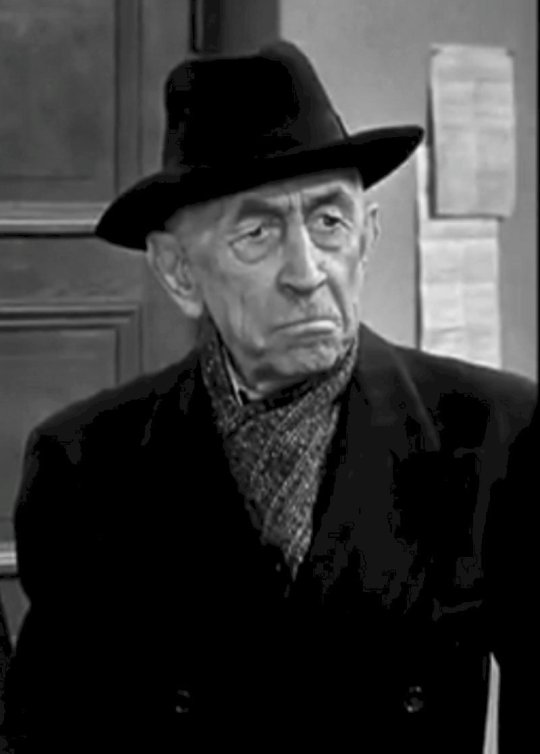
“But nothing can be good in Him, Which evil is in me.” - John Greenleaf Whittier, The Eternal Goodness, 1865.
There was an aged man in town who reminded everyone of old Ben Weaver from the Andy Griffith Show. He always kept score and never let a slight against him slide. He was a stickler for doing things right, and the smallest deviation from doing things his way, the right way, was duly noted and registered in his little book that he might well have titled, The Misdeeds of Others. If anyone ever got on his wrong side - which was pretty easy to do - it wasn’t good enough to go have a talk with him, honestly tell him you were sorry, and ask for his forgiveness. He always demanded recompense, and a little extra in the payback. Did your child break his window with a baseball? Apologies be damned, you had to fix the window, which I suppose is understandable, but the way he figured, that wasn’t enough. I mean, the window was perfectly fine before your kid played Nolan Ryan with it and his life was disrupted with all the bother and the mess and the broken glass and the temporary patch job and the loss of peace of mind and house. Your boy saying he was sorry wasn’t enough. Your saying you were also sorry wasn’t enough. Your fixing the broken window wasn’t enough. That didn’t “even things up.” You still owed him because of the, what is it the lawsuits call it - “punitive damages.” And, I mean, he wasn’t wrong, but he wasn’t much loved by his neighbors either.
Have you ever known someone like old Ben Weaver? Did you like them? Did you think they embodied goodness? Would you consider them Christlike? Honestly, would you even want to be around them?
I’m assuming by now you know where I’m taking this - why are these qualities considered less than good in old Ben, but perfectly fine and dandy when we speak of the person of God? Why are the qualities we find reprehensible in fellow humans somehow considered “good,” “just,” and “right” when applied to God? God keeps track of our misdoings - but that’s OK, he’s God. God demands payment for our wrongdoings - but that’s OK, he’s God. God has to be “satisfied,” not only with recompense, but even with punitive damages - but that’s OK, he’s God.
So many times when I bring up this incongruity, people respond with, “Well, the Bible says God’s ways are not our ways.” What does that even mean? Better yet, “What even does that mean?” We can’t throw that line out as some kind of defense of God every time we run across him being attributed qualities which are reprehensible in every other living thing. The truth of the matter is that when God says that of himself (in Isaiah 55.8 and surrounding verses), he is specifically referring to his extraordinary level of mercy, not his “just demands,” or his wrath.
In point of fact, in Amos 1.11, God condemns Edom for these very faults. Edom “cast off all pity,” his “anger tore perpetually,” and he, “kept his wrath forever.”
For the love of God, let’s all please stop saying that something is good when it is in God, but terrible when it is in creatures created in his image. God is not like the sins he condemns. Let me say that again in bold, God is not like the sins he condemns.
“But,” folk respond to me sometimes, “God is so majestic that even a slight sin against him demands justice. He is a great king, and a crime against a king is greater than a crime against a commoner.” Seriously, I’ve been told this, because this is kind of a classic argument from medieval days that has hung around till now. But I say hogwash. If a king has an orchard with 10,000 apples and I steal one, that isn’t a greater crime than me stealing an apple from my neighbor who has only one apple. In fact, the deed done against my neighbor is worse (remember Nathan’s parable to King David). God’s greater majesty doesn’t mean he is more exacting in dealing with offenses. It means precisely the opposite: “Let us fall into the hands of the Lord, but not into the hands of men; for as His majesty is, so also His mercy.” (Sirach 2.18)
Anyway, where was I? Oh, yes, oftentimes when I teach or write about God’s love, his mercy, his forgiveness, I am met with, “Yes, but…” and what follows is a demand that I balance it out with focusing on his justice, and wrath, and righteous punishment. Laying aside for a moment (actually for this whole article) that I believe good, solid, orthodox theology does deal with these issues without abrogating the mercy and love of God, what I find intriguing is that these very same folk, when they hear a sermon or read an article about God’s just demands, his wrath, his punishments, never bring up the, “Yes, but” remark then!
It is almost as if something within our spiritual framework can’t handle the idea of a God who really and truly forgives without demanding payment; that there is something in our spiritual condition that can’t abide a God who acts toward others the way he teaches us to act toward others. I suspect that maybe way down at the bottom of our hearts the reason we don’t want to see God in this light is because it would demand that we who follow him also really and truly live the same way. That “something” in our spiritual framework, that certain je ne sais quoi as the French say with such flair, is what St. Paul would call, “the flesh,” and it isn’t from God, and it isn’t like God.
John Greenleaf Whittier, whom I quoted at the beginning of this article, was a 19th century American poet, and a devout Quaker. When you read the whole of his poem, The Eternal Goodness, you discover that it is a conversation between Whittier and a friend who keeps bringing up the, “Yes, but.”
I walk with bare, hushed feet the ground Ye tread with boldness shod; I dare not fix with mete and bound The love and power of God.
Ye praise His justice; even such His pitying love I deem: Ye seek a king; I fain would touch The robe that hath no seam.
Ye see the curse which overbroods A world of pain and loss; I hear our Lord's beatitudes And prayer upon the cross.
I have a dear pastor friend who was discussing theology and the Bible with me one day, and jokingly said, “I’m going to go home and look it up in Greek, and make it say what I want it to say!” We both laughed, because he wasn’t serious, but he was onto something. Folk can make the Bible say whatever they want it to say. They can find verses here and connect them with verses there, and paint a very Ben Weaver portrait of God. I would suggest, instead, that we look at Jesus. “If you have seen me, you have seen the Father,” he told Philip (John 14.9). The Old Testament saw God, but only in shadows (Colossians 2.17), “but the substance is of Christ.” Abraham, Moses, David, the prophets - they saw God, “in many parts and in many ways…,” the writer of Hebrews tells us (1.1), “in bits and pieces” (Phillips), BUT, “…but in these last days he has spoken to us by his Son…He is the radiance of the glory of God and the exact imprint of his nature” (1.2). If you really want to know what God is like, he is like Jesus.
I really wrote this whole long article to make a single point, which I guess I could have just come right out and said and saved everyone a lot of time and trouble: enough of this seeing something as good in God, but as evil in others. If it isn’t good in old Ben Weaver, it isn’t good in the Almighty either.
Not mine to look where cherubim And seraphs may not see, But nothing can be good in Him Which evil is in me.
The wrong that pains my soul below I dare not throne above, I know not of his hate - I know His goodness and His love.
2 notes
·
View notes
Text
Wheel of Time liveblogging: The Gathering Storm ch 28
I’m back! With front row seats to the zombie apocalypse, some musings on the writing of Mat’s character, and an appreciation for not-so-subtle symbolism
Chapter 28: Night in Hinderstap
Apparently it’s a surprise murder party. Where’s my invite?
I’m just not even going to comment on “I can’t rightly be blamed for their unsociable behaviour!”The less said about that, the better. It never happened. Quote? What quote?
A group of raving men soon descended on the two villagers Mat had hamstrung, beating their heads against the ground over and over until they stopped moving. Then the pack looked up at Mat and his men, bloodlust clouding their eyes. It was an incongruous expression on the clean faces of men in neat vests and combed hair.
Everyone’s trying to kill everyone else and is anyone else here reminded of that church scene in Kingsman? Or really any kind of zombie-apocalypse-esque scene from anything ever? Maybe Shai’tan’s a fan of pulp fiction?
The real question here, of course, is this: how did the villagers know this was going to happen? They clearly knew – or at least, they knew somethingwas going to happen at sundown; they were too vehement about the curfew for it to not be something sinister – but if this had happened before, how are any of them alive? And if it hasn’t happened before, how did they know? Also if it’s a one-off thing, the patches on clothing and lack of trade wouldn’t make sense…
Or maybe it’s a ten plagues sort of deal: something happens every sundown, or frequently at sundown, but it’s something different every time. So they know to set a curfew and they want people out, but…
Oh, maybe bad things only happen at sundown when outsiders are in the town? Or have I just read too many far-right campaign speeches?
And the zombie apocalypse continues. This is definitely weirder than ghosts. Pattern? Hey, Pattern, you feeling okay?
“The gold!” Talmanes said. “Burn the gold!” Mat said.
No, Mat, it’s pillage beforeyou burn. Come on, that’s practically the first rule of piracy!
So they start trying to get the hell out of dodge. Zombie apocalypses: keeping our borders secure.
Sorry, I’ll stop.
“This isn’t just about our wager,” Mat said, listening to the screams and shouts.
No shit, Sherlock. The Pope is Catholic, bears shit in the woods, the Dragon Reborn needs therapy, and this is definitely not just about your fucking wager.
Down a side road, a couple of struggling bodies burst through the upper window of a house.
Everything’s better with defenestration!
I’m absolutely picturing this happening with a lively scherzo playing in the background, by the way.
Indeed, it seemed to him that the darkness had come tooquickly here.Unnaturally swift. The road’s length squirmed with shadows, figures battling, screeching, struggling in the deepening gloom. In that darkness, the fights looked at times to be solid, single creatures – horrific monstrosities with a dozen waving limbs and a hundred mouths to scream from the blackness.
Subtle.
But certainly effective; it’s a well-painted picture of horror with very clear undertones of greater chaos and darkness. Jordan was good at these occasional short forays into horror, and this measures up reasonably well.
“Light,” Talmanes yelled as they galloped toward the inn. “Light!”
I see what you did there. The image of unnatural, roiling, violent darkness, and the ensuing cry of “Light!” from the one charging into it.
Because that’s what we’re coming to, now. The end – the Last Battle – is no longer some distant looming threat on the horizon; it’s imminent and immediate and everything else is fraying at its approach, the veneer of order cracking and the pieces so desperately held together falling apart, the places that once may have thought to be passed over unscathed are feeling the touch of apocalypse, and the underlying battle lines: Light and Shadow, are becoming more and more apparent. There isn’t room for anything else, try though they all might.
The night itself seemed to be trying to smother them, to strangle them, and to spawn beasts of blackness and murder.
So in other surprising news, I am still and always a sucker for not-really-hidden secondary layers of meaning. What can I say? I’m a simple girl of simple tastes.
They screamed and hissed, like legions of the drowned trying to pull him down into a deep, unearthly sea.
I was on a plane earlier today, flying over a city that clearly has precisely no chance whatsoever at surviving a sea level rise of even a metre or so and I’m reminded of it here, of clear impending disaster and how humanity responds. Which seems to be, in life as in fiction (in fiction as in life?), to ignore it in favour of other petty conflicts.
He hated fighting in darkness, he bloody hated it. […] It reminded him, briefly, of another night, killing Shadowspawn in the dark.
Hate to break it to you, Mat, but there are going to be more of those nights to come – and I don’t think even you would take the long side of that bet.
Except now of course these aren’t Shadowspawn, but in the growing darkness it becomes harder to tell the difference.
For a moment, it seemed Mat fought the shadows themselves – shadows made by sputtering firelight, random and uncoordinated, yet all the more deadly for his inability to anticipate them.
An interesting line, read through the lens of potential foreshadowing, regarding the Light’s likely general...
Ha, foreshadowing. See what I did there?
Okay, sorry.
Shadows bled where he struck
None of this is remotely subtle but it’s more fun than most of Sanderson’s Mat has been so far, so I’m going to enjoy it and YOU CAN’T STOP ME. So there.
(I haven’t slept in about 36 hours because overnight flights are hell; give me some slack here).
Thom throwing some of his last knives to save Mat as they flee on horseback from a town that becomes deadly with the fall of night…now where have we seen this before…
He didn’t know horseback battle commands himself, but those blasted memories did
This seems off, though perhaps more in the phrasing than the sentiment. Mat usually couches that sort of feeling in terms of being the one to remember, even if the memory belonged to someone else originally. Then again, he’s not exactly at a point of feeling particularly charitable towards the Eelfinn and their gifts, so okay.
“Thank you. For coming back for me.” “I wasn’t going to leave a man to that,” Mat said, shivering. “Dying on the battlefield is one thing, but to die out there, in that darkness…Well, I wasn’t going to let it happen.”
This, too, feels a little bit off – as if Mat should be thinking it rather than saying it. In these sorts of circumstances he has a tendency to almost awkwardly brush off thanks and praise, as if he’s uncomfortable taking it, saying something about ‘anyone would have done it’ or ‘I don’t have enough men to replace you if you died’ or something else that sounds slightly more callous than his actual motives. But again, it’s not completelyout of character, just…a little unusual, it seems. Which could mean it’s actually off, or could mean I’m overly aware of anything that doesn’t fit my own mental picture of Mat, and because his last few chapters have been…interesting…confirmation bias is working against Sanderson here.
I give up; I can’t quote all the light/shadow imagery with secondary meanings here. But there’s a lot of it and I do actually enjoy it. It’s the sort of thing that, at least at this point in the story, I don’t think needs to be subtle. It’s the entire focus, after all – so the idea is that it’s permeating everything, that even the little things have been pulled into this all-consuming war of Light against Shadow, that nothing is free of it this late in the game, especially when the ta’verenstand at the centre.
Mat argues with Aes Sedai; what else is new.
The robe was parted slightly at the top, giving a hint of what hid inside. Talmanes whistled softly.
I miss the actual character of Talmanes. I never liked Nalesean as much and I’m not thrilled to see him here, having done an Arya and stolen Talmanes’s face somehow.
“She’s not a woman, Talmanes,” Mat whispered warningly. “She’s an Aes Sedai. Don’t think of her as a woman.”
Yes, because with the true battle lines drawn before you, between Light and Shadow for the future of humanity and future itself, what you really want to be focusing on is dehumanising your own allies.
“It’s as if the darkness itself intoxicates them,” Thom said while Mat helped Delarn into his saddle. “As if Light itself has forsaken them, leaving them only to the Shadow…”
Ah, Thom, we can always count on you to point out the symbolism inherent in the situation, just in case we’ve missed it. This is why you bring the bard along.
“Not my fault, Talmanes. How was I to know that staying would cause them all to start tearing each other’s throats out?” “What?” Talmanes asked, glancing at him. “Isn’t this usuallyhow people react when you tell them you’re going to spend the night?”
STOP. RUINING. TALMANES’S CHARACTER. FOR THE SAKE. OF A PUNCHLINE.
Part of the problem is that Jordan’s characters just aren’t constructed to carry this style of banter, whereas it’s something of a staple of Sanderson’s. Both styles are fine – mileage will vary depending on individual readers’ tastes, of course, but both are at least internally consistent – but this is definitely one of those places where they very much are two distinct styles, and they don’t merge very well on this particular field.
It’s part of why Mat seems to be the character Sanderson struggles most with, at least thus far; more than any other major character, Mat is at the mercy of the author’s sense of humour.
Well, more than any other major character with the very possible exception of Nynaeve, but I have a theory about this one. I’ll save that one for another time, though.
Actually no, you know what? Let’s just do it here because this is stream of consciousness and it’s on my mind now. Also I’ve already gone political in this post so let’s go ahead and throw a gender discussion in as well, for shits and giggles.
Nynaeve and Mat, as I know I’ve talked about before and as I’m sure plenty of other people have talked about, have quite a lot in common in terms of their characterisation and the role they fill in the story. Both have the self-awareness of a particularly unintrospective goldfish, both love to dress up in dramatic irony for a night on the town, both are incredibly loyal and will stop at nothing to protect those they love, and both are often used for comic relief, when one (or both) of them is in a scene where comic relief is called for.
So why does Sanderson seem to get Nynaeve mostly right, while wildly missing the mark with Mat? (check out that alliteration).
I don’t think this is the only reason, but I think part of it is to do with the gender of the characters, and the resulting filters Sanderson, like many readers, would subconsciously be perceiving them through, and thus also writing them through.
In Nynaeve and Mat we have two very similar characters, but the emphasis – in the narrative and also, it seems based on my (admittedly limited) interactions with other readers, in the way they are perceived – with each of them is on versions of those shared traits that are coded more masculine or more feminine. Loyalty tilts towards chivalry and honour (‘masculine’) in Mat, and towards the nurturing, caretaking, and healing side (‘feminine’) in Nynaeve. Mat’s blindness to his own character reads as funny, where Nynaeve’s tends to read as more annoying and hypocritical to many. Mat’s irreverence reads and is treated as roguishness; Nynaeve’s as rudeness.
Not all of this is criticism, exactly; it’s more just observation of a pattern. There are things I wouldn’t mind seeing done differently, but I think for the most part both characters are well-handled, and serve as good parallels to each other in different situations.
But let’s bring it back to humour, and Sanderson’s ability to write one of these characters better than the other.
I think, perhaps without consciously framing it to himself this way, Sanderson sees Nynaeve not as ‘funny’ but as a character around whom funny can happen. She can be used for comic relief, but her character doesn’t read immediately as ‘the funny one’ because her irreverence and lack of self-awareness are treated as character flaws – and as flaws and aspects of her growth, they’re done well – because we as a society tend to see those things as flaws in women, more so than in men.
This, then, is how Sanderson seems to write Nynaeve (at least based on the little I’ve seen so far). It’s also how Jordan wrote Nynaeve, and it thus is consistent with her character and with the way she has grown and changed over the course of the story. And when it’s time to throw comic relief at her, she doesn’t make jokes, but instead gets herself into situations that are funny because of who she is and how she reacts.
This, incidentally, is also largely how Jordan wrote humour involving Mat. However, we’re more primed to see Mat as an inherently funny person, because in a male character that’s how those traits combine. To our unconscious filters, Nynaeve should be the butt of the joke; Mat the one making the joke. Except…most of the time, Jordan’s Mat isn’t. He’s irreverent, yes, but the humour around him is actually written much like the humour around Nynaeve; it’s the result of dramatic irony: the character not seeing what is immediately obvious to the audience. We’re all in on the joke, at Nynaeve’s or Mat’s expense.
Sanderson gets Nynaeve’s character right because in a female character this combination of traits doesn’t immediately scream ‘funny’.
But Sanderson gets Mat’s character wrong because in a male character this combination of traits, to the set of filters and biases a reader in our society is likely to possess without realising, doesscream ‘funny’. In Nynaeve it’s easier to see a set of individual traits; in Mat there’s more likely to be that immediate association that gets in the way of seeing how the character is actually used, and how those traits come into play.
Again, I don’t mean this as a harsh criticism of Sanderson; unconscious bias is a pretty strong thing, and it’s an easy trap to fall into without even realising – hence the ‘unconscious’. Also, to his credit, he has made a fair bit of progress in this general area across his writing career.
But that’s my theory, such as it is.
And now back to the zombie apocalypse and your not-so-regularly scheduled nonsense.
There was an odd wrongness about the entire experience. Was the curfew intended to keep this from happening, somehow? Had Mat, by staying, causedall of these deaths?
Rand isn’t the only one who can leave destruction in his wake – though he does probably have the most impressive track record so far. Still, Mat can claim the harbour at Ebou Dar and, you know, gunpowder. It ain’t easy, being a ta’verenwith a conscience.
“It’s not going to leave me alone, Thom. […] That bloody gholam is out there, I know it is, but that’s just a part of it. Myrddraal and Darkfriends, monsters and ghosts. Chasing me and hunting me. I’ve stumbled from one disaster to another, barely keeping my neck above water, ever since this began. I keep saying I just need to find a hole somewhere to dice and drink, but that won’t stop it. Nothing will.”
Wow, Mat, that sounds almost like self-awareness, and acceptance of your role in all of this. And he has shown that more and more; he knows now that he can’t just run; it’s gone from being an actual plan circa TSR/TFoH to a wistful fantasy he occasionally indulges in. He knows the Last Battle is coming, knows he’s ta’veren, knows he can’t run from this. And more and more, he’s having to actually admit that, and face it straight on. You can’t strategise when you’re constantly half-trying to run away.
“Burn me, I wish they’d all just go bother Rand. He likes it.”
Ow.
“You really think that?” Thom asked. Mat hesitated. “I wish I did,” he admitted. “It would make things easier.”
This is one where maybe it’s out of character writing but I’m actually going to take it at face value, as Mat having to face some harder truths rather than dodging them as he has in the past. He knows this all already, and knew it before, but it’s different to actually have to admit it out loud. To deny yourself the refuge of denial and glib evasions.
It would make things easier – just like telling himself he’ll leave as soon as this battle is won, and then this battle, and then that errand, and then and then and then would make it easier – but he can’t afford that anymore.
It’s not the first time he’s realised this, exactly, but it feels less…forced, now. He accepted that he was ta’veren, accepted that he would have to fight in the Last Battle and that he couldn’t just leave, accepted a degree of responsibility for those he leads, but at every stage there’s resistance. First he resisted the whole thing, trying time and time again to leave. Then it was a case of resisting every step along the way, grudgingly accepting one thing after another. Just as Rand has crossed lines in the sand, trying and failing to set boundaries that he can stick to, and always in the end violating them down to ‘the last that could be done’, Mat has followed a path of crossing one line and then the next, taking one step and then the next, fighting it all the way but still ending up there. The difference, of course, being that Rand’s crossing of lines has largely been down a moral slope towards the point where he believes himself irredeemable, whereas Mat’s path has been one of gradual acceptance of his role. But the concept is the same, of resistance but then movement.
Now, he’s more freely admitting all of this. He’s not fighting it so much, anymore. He has almost reached the end of that path, the point where he can step into his place for the ending, as the person he needs to be, accepting it fully.
It’s what they’re all heading towards, now, one way or another. Moving into their final positions, completing their final arcs, taking on their roles for the ending. Accepting who they are and who they must be, and what that means.
(I mean, Rand is still very obviously struggling on that one, but in a way he’s also drawing closer – there’s a breaking point coming. He’s hit what seems like an absolute low; he’s broken and dark and tearing himself apart in an effort to hold himself together, under the pressure of everything that has been building and building and building towards the point where he has to finally…either accept his role in truth, or not).
“Lies never make things easier in the long run. […] When you tell them to yourself, you just bring more trouble.”
Wise words, Thom. And Mat’s finally at a point where he’s maybe ready to hear them; to accept that he has been lying to himself at each step along the way. Denial and self-deception layered on top of itself, peeling some away at every step. And now he’s having to face the last of those lies, and to leave himself without the comfort of those denials to shield himself.
That’s one he absolutely shares with Nynaeve. She, too, has had to peel away the denials and lies she tells herself in order to protect herself, to bring down those walls step by step.
“It strikes me that the people were expecting this. Or something like it.” “How could they have been?” Mat said. “If this had happened before, they’d all be dead.”
GOOD FUCKING QUESTION.
Aw, Mat’s got his very own wanted poster. Our little rogue’s all grown up and worth a bounty.
“Handsome fellow. Good nose, straight teeth, dashing hat.”
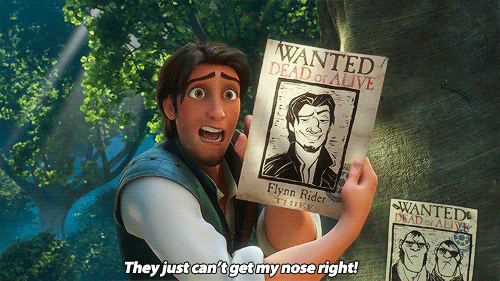
Um.
The prisoners are just…gone?
Is there some kind of groundhog day shit going on here?
There is some kind of groundhog day shit going on here.
“You!” he said, pointing. “I killed you!”
I have to say, it had more impact when it was Rand saying that to Moridin. Still, it’s always a good line when you get a chance to pull it out.
So it’s groundhog day meets zombie apocalypse. How…delightful. Murder spree every night with no consequences!
“The oddities were small, you see. A broken door here, a rip in someone’s clothing they didn’t remember. And the nightmares. We all shared them, nightmares of death and killing.”
No consequences, that is, except extreme trauma for the entire population. That is creepy as fuck.
Though they seem to be dealing with it as well as they can, all things considered. I’ve got to hand it to the mayor; the guy does his best to maintain rationality in all circumstances. He’s sort of the classic badass NPC – he’s probably not all that important to the overall story and we only see him for a brief moment, but he’s just making do as well as he can in a story that’s well above his paygrade: standing up to a protagonist, calmly discussing the fact that his entire village murder each other every night, and standing firm by the rules that you don’t talk about fight club.
But now I’m wondering what purpose this serves, in the grand scheme of things. Narratively, I mean. We’ve seen ghosts, we’ve seen So Habor ruined by them, we’ve seen a town appear and vanish, we’ve seen bubbles of evil…why two chapters on this? Why this weird recurring zombie apocalypse? It seems like an odd thing to include just to highlight how completely fucked the world has become; we have plenty on that already that isn’t quite so…involved. Or is this just Sanderson having fun for a chapter or two? It’s the sort of concept I can imagine he’d enjoy playing with – what happens when the fabric of reality and time begins to unravel…
“So just leave,” Mat said. “Leave this bloody place and go somewhere else!” “We’ve tried,” the mayor said. “We always wake up back here, no matter how far we go. Some have tried ending their lives. We buried the bodies. They woke up the next morning in their beds. […] We were curious to see where you’d wake up. Most of the rooms in the inns are permanently taken by travellers who are now, for better or worse, part of our village.”
That’s interesting…so people can be dragged into this and trapped there. Huh. Okay. Hmm.
The mayor continues to be his badass NPC self, by declaring that he’s not going to sell Mat out to whoever put up the wanted posters. The man has his principles and he sticks to them, come hell, high water, or a larger storyline.
Who was looking for him and Perrin, and what did they want?
Do you really have to ask?
But I suppose we’re off to find out.
Next (TGS ch 29) Previous (TGS ch 27)
#maybe I shouldn't write these after sleepless overnight flights#but where's the fun in that?#Wheel of Time#neuxue liveblogs WoT#The Gathering Storm
59 notes
·
View notes
Text
What Nelson Mandela Taught Me
He was released from prison just about the time I was beginning to comprehend the meaning of apartheid. It was in awe when I heard of a man who; despite being proclaimed a terrorist inspired and reconciled a nation of disparate interest through his perseverance and dignity.

Nelson Mandela taught me the precious lessons of life that have become my principles in many things that I do.In a childhood empowered with a Catholic education and moral science lectures; I realized that sometimes, it may lead a person away from the realities of life. Leaders are not infallible. They are human like you and I. In real life, there are no Gods. We are all full of inconsistencies and incongruities. The acceptance of that is key to possibilities that there is nothing that is not possible. That has been the premise of my journey as a human being.We are weak and strong, big and small, right and wrong. In his attempt to do the right thing by himself, Mandela taught me that one person’s right is another person’s wrong. In the event of a confusion on my own definition of the right thing to do; I evaluate my own core beliefs. I have learnt that beliefs may never be black and white. That truths are never absolute. That core beliefs define a person and they need to evolve in the whole process of a person’s personal development. This often requires a purposeful intention and an ability to change what is norm. To challenge how things are done and to try new ways of doing the same things. Often failing. But never giving up.I learnt to dream of the impossible and focus on making it possible. During the 1985 soccer world cup, Jason Tshabalala told Madiba that as per experts the South African team may reach the quarter final and no further. Mandela smiled and said – According to experts, you and I should be dead.There will always exist a precedence of things not being done or an expert who tells you what works in a certain circumstance. I have learnt that there is always another way. There is always a possibility. And that till that last possibility is not exhausted; I will not give up or give in. I also realized as I grew older that possibilities are endless. The only thing that often makes people give up is impatience or failure to focus. He said – It always seems impossible until it is done. It does.I learnt that I am responsible for my own destiny. I am the master of my fate and I am the captain of my soul. I have choices to make every day. I am responsible for those choices and the outcome of each of those decisions. What is important is that I learn in the process. What is important is to realize that the past disappointments and glory have no significance except in the process of learning. I learnt to invest my energy in creating an optimal present and future. After climbing a great hill; there are always many more hills to climb. I have learnt from him to take a moment to steal a view of the glorious vistas and look back on the distance that I have come. He has taught me not to linger for there is more to be done and that this walk will never end.Fear is the basis of all anxieties. I learnt from Nelson Mandela to be fearless. I learnt that to be fearless the first thing I need to conquer was my own apprehensions. The fear of failure, the fear of loss, the fear of social structures, the fear of not being the best, the fear of not being able to please everyone and the fear of losing friends. Mandela taught me that I am strong enough to face my fears and remove the existence of these reservations from my life. I learnt to take calculated risks. I learnt to understand that people around me will be as transient as their aspirations. I understood that the only true companion that a person ever has is his own courage to live life at his own terms. To look at what I have with humility, be grateful for the courage I already possess and accept that people around me may not make the same choices.Nelson Mandela taught me never to settle for a life less than one that I was capable of living. His life taught me to be prepared to work and succeed or fail based on my own merits. Every failure is a chance for me to improve myself.He taught me to stand up for what I thought was right and voice my concerns about what I thought wasn’t. I learnt that just to have an opinion was not good enough. I learnt that despite the merits of rights and wrongs; people will take the side of the situation that suits their agendas the best. Some of these people will be your well-wishers and friends. I learnt to respect their opinion and never assume them to be on the same side of the table just because you anticipated them to be.Once during a customary tea with Francois Pienaar, at the beginning of his presidency, Nelson Mandela asked him about what Francois’ philosophy on leadership was and how he inspired his team the best. Francois answered Mandela that the best way to lead is to lead by example. Mandela asked him again about how he thought he could make his team think that they are better than what they think they can be? Was it inspiration that led people to believe that they could do more than what they think they were capable of? Anything can be an inspiration. A song that you know. A story that you hear. A quote that you read. Anything that may allow you to expect more of yourself.We need inspiration. All of us do. You were mine Mr. Mandela. You help me exceed my own expectations. And your principles will continue to guide Meera Kaul.
1 note
·
View note